#its the rampant sexism and objectification
Explore tagged Tumblr posts
Text
Goddammit im starting to feel the berman on star trek enterprise
#illustration#star trek enterprise#its the rampant sexism and objectification#why is archer attracted to t'pol it doesnd work
6 notes
·
View notes
Text
Blog #4: The Sexualization and Objectification of Women and its Effects on its Viewers (9/23)
Next, I'll be talking about the sexualization &objectification of women in the media, the message it's sending, and its effect on its viewers. More times than not, I've seen advertisements, billboards, TV shows, films, magazines, and commercials objectifying sexualizing women for their own profit and the male gaze. Remember, a conventionally attractive naked body will bring in profit, money, and power, reinforcing this negative cycle of objectification. The majority of film makers or corporations that create movies are controlled by men. [Don't even get me started on the sexualization of women in video games, treating them as nothing but a sex trophy, seen as something to be won]. This leaves so much space and control for men to depict female characters and use women as they please. AKA allowance for sexism to run rampant! The sexualization of women online can translate to real-world violence and suppressive norms. I also think that the forceful sexualization of women in digital media and films takes away from women's choice to show their bodies, which can be self-empowering and showcase their own agency to use their bodies how they want to use them.
According to graph by the Annenberg School of Journalism, “over the past 10 years, top films have shown more than 40 percent of young women in “sexy clothes and 35 percent with nudity” (Smith et al., 2017). While women are already underrepresented in many careers, leadership roles, and specifically films, they are also objectified and used to evoke sexual desire in consumers. Many female characters and films don't get to show their personality, have an opinion, or have control, or power. Instead, they are given roles as a sexual “sidekick”, to keep people watching the films. As portrayed in Disney, many female characters exist primarily to serve the male protagonist storyline, such as Jasmine and Aladdin, Esmeralda in The Hunchback of Notre Dame, and Meg from Hercules. For example, in The Wolf of Wall Street, Margot Robbie is used as a sex pawn and has no other big role in the movie other than to be sexy and objectified. In a movie about scamming and life on Wall Street, there is no objective reason as to why her character should be naked, it is only for the male gaze and to push the agenda that it's OK to objectify women. Giada Gavazzi says that “ her main contribution to the film is aesthetic: we see her fully naked in one scene, topless in another, and otherwise clad mostly in lingerie and tight dresses” (Gavazzi, 2022).
Women are hyper-sexualized in the media, and it is everywhere. There will be commercials or digital advertisements that are trying to sell things that have nothing to do with a woman's body, but they use a woman's body to sell the product. And in this case, women's bodies are being used as sellable commodities and objectified via sexualization of them. I've even seen a soap commercial that uses a naked woman in the commercial and for what? To use women as a distraction or an object – the woman is the object getting as well. Elizabeth Gonzalez, in a presentation, made a really good distinction. She explains that sexualization occurs in four components. To paraphrase, women are first sexualized when their value is determined by their physical or sexual appeal, not their personality. The second is when young girls are treated as sexual or sexualizing children. The third is when a woman is held to a standard that only equates their attractiveness to being sexy, naked, or hot, rather than being smart, kind, or intelligent. The last is when a woman is made into a tool for others' sexual desires, rather than treated as a human person who has agency and independence. All of this exponentially is occurring in the media, specifically, films, and examples are shown in many of the classic Disney films.
It happens in politics, rallies, and other important events. What I also want to mention is how the sexualization of women takes away from the fights that they may have to battle. For example, in Pocahontas, the young Indigenous woman is sexualized and romanticized in a way that takes away from the historical event that is happening in the film. Pocahontas and the rest of her tribe are fighting for their lives, their land, and their agency. At the same time, Disney is creating a character who is seen as sexy and in need of a husband, to gain happiness. Sexualization here is being used to mask the reality of a brutal and cruel situation, which is colonization and genocide. This classic message is that life can be fixed with a man and that a beautiful, sexy woman will not have any issues if they have a man who is sick and shown in a sexualized narrative. Pocahontas does not need to be shown in sexy clothing that is not at all representative of Indigenous tribes, etcetera. This type of sexualization, on a broader scale, serves as some type of distraction from the deeper issues and battles that women face, such as inequality, systematic violence, and dehumanization. By focusing on a woman's breasts, no structure, cleavage, or waist-to-hip ratio, it honestly dulls conversations about women's rights, agency, and independence that women still fight for. In this case, it also masks the reality of the situation in the movie Pocahontas; Pocahontas and the rest of her Indigenous tribe are fighting for the land that they own.
To bring the Disney corporation into this as well, there are far too many examples of the princesses being sexualized and objectified. Just to note, many of the Disney princesses are very young, I'm talking 11 to 14 years old --some of them are dressed up in very revealing shorts, busty shirts, showing cleavage, and being half naked. Why do young characters need so much revealing clothing, if the Disney corporation is not trying to send a sexualized message about women to the consumers? Unfortunately, Disney sexualizes adolescent and preteen princesses, because they have An audience of not only young children, but parents and adults. How do they get older people to also watch these classic Disney films? Well, they make some of the women look sexy, flirtatious, and stunningly beautiful, to attract the male gaze and male viewers. Although on one side these princesses are idols for young girls and boys, they're also sex symbols for adults and older individuals. Pocahontas tells the story of an 11 to 12-year-old girl, who is romantically involved with a man. Jessica Rabbit is shown as a very voluptuous sexy symbol. Esmeralda from the Hunchback of Notre Dame. Ariel from The Little Mermaid only wears a bra and shows 75% of her entire body, and she's a young girl. Hanes found that even “ The Geena Davis Institute on Gender and Media found recently that even animated female characters tend to wear sexualized attire: Disney's Jasmine, for instance, has a sultry off-the-shoulder look, while even Miss Piggy shows cleavage” (Hanes, 2011).
Once again the prominent sexualization of women in films or digital media helps to shape perceptions of how women are valued and seen. From Coca-Cola advertising campaigns to the Friends TV show and the classic Disney Princess films, women are often depicted as mere objects of sexual desire, which do not attain agency, control, or power, and don't even get me started brains or intellect. This type of representation and sexist stereotype that prioritizes conventional beauty, bodies, and physical appearance is extremely harmful. The agenda is pushed that a woman's worth is linked to her body or sex appeal, which can have effects on both girls and boys, who view films that portray these messages. For example, if young girls and women view movies where women are constantly sexualized or used for their bodies, this can lead women to think that they are only as good as their bodies. Or that they need to achieve the unattainable beauty standards that the male patriarchy portrays through Disney films, such as a thin waist, a button nose, voluptuous hair, fair skin, etcetera. This can tank self-esteem, and create body image issues, and mental health disturbances. On the other hand, for young boys, it teaches them that it's OK to only look at women as inferior objects or as simple bodies come up rather than recognize them as individuals with agency and independence.
Persistent viewing of sexualized images holds the potential to desensitize young audiences, which creates the normalization of objectifying women. Swagata Sen says that “men tend to internalize that message, and it influences their subconscious biases of how they view women… they legitimize violence, harassment, and anti-women views” (Sen, 2019). The more this happens, the more people believe this is how socialization and society should function. Men have created dominant views in the USA because they are seen as the ones whose decisions and views should be taken as "facts." This includes perpetuating the idea that women are just objects that can be used and paraded around for men and their happiness or that when we have to look sexy and hot to even gain an ounce of respect or attention from our male counterparts. Furthermore, because the devaluation of women has become ingrained in daily life via digital media (AND DISNEY MOVIES), the widespread adoption of such imagery and characters fosters social acceptance of sexism and sexualization.
In the Disney movies, the female characters were way more sexualized than the male characters. They were wearing clothing that was revealing of a sexualized body part or physical feature and treated as objects, in a way. One person even said, "Ariel’s cinched waist and round derriere reminded me of Kim K, which is a little disturbing to see…” (Dockterman & Stampler, 2014). according to Disney, she's a 16-year-old girl. She is one of the youngest daughters of King Triton but is portrayed in such a way as to make her look much older and more developed. She has a seashell bra that is very provocative, shows 80% of her body, has perfect hair and skin, and a tinier waist than the length of her eyes. To me, this is outright sexualizing a young teenage girl, which has even broader implications to women in general Sexualization does include making young childlike girls look more adult like and sexy. I think that it's very twisted and pushes a certain agenda to make women look a certain way, via the way they portrayed Ariel in The Little Mermaid. In this short clip (https://www.youtube.com/watch?v=LG6zL909y_o&t=99s ) much of the focus and shots are on her body. Even I am watching back the film, couldn't help but stare at how beautiful and perfect she looks. It makes me feel bad about myself! I'll never have the waste of her, or the voluptuous lips, hips, breasts, and etcetera. Disney showcases but a perfect and conventional woman looks like, which is aerial, which sexualizes women in a negative way. I don't know if I know one woman who naturally looks like that, and women who do look like that are sexualized. Women who are beautiful, get catcalled, sexually harassed, and objectified for their looks, which is instigated via digital media and Disney films.
We also see this in Jasmine from Aladdin. Jasmine is supposedly around 15 or 16 years old. She wears a tiny crop top, and flowy pants accentuate our tiny waist and big size. She has perfect eyeliner, huge eyes, perfect hair, and tiny wrists and feet. Again, she looks breathtaking and stunning but focuses on her body rather than what she wants for her life and decisions. She even says in the movie that she is not an object or a prize to be sold or won. Jasmine says in this small clip (https://www.youtube.com/watch?v=Q_WRPz-arFA ), “ …all of you standing around and deciding my future, I am not a prize to be won.” They outright objectify and sexualize Jasmine in the film, her father, the Sultan, Jafar, and other men who are begging for her on their hands and knees. Another point that I want to point out is the dominance of the sexualization of women of color in the media in general. Women of color are often sexualized and objectified and stereotyped as exotic, sexual, or erotic -- which stems from racist and gendered depictions. The intersection of race and gender can be seen here in Jasmine or Esmeralda. Jasmine is a woman from the Middle East, unsure of her actual ethnicity. Women from the Middle East are often sexualized and exoticized when portrayed in white contemporary films, more so than if a white character is playing the same role. Back to my point, many women in the Middle East do not regularly wear revealing clothing because it's a part of the culture or religion. There is no good reason that a young 16-year-old Princess named Jasmine should be sexualized in a way where she's wearing ‘suggestive’ clothing(or written into the storyline as such) because it's not representative of who she is supposed to be.
There's also a scene where Jafar imprisons Jasmine. Again, she is dressed in the sexiest attire, with, well, I'm sure, his hair, beautiful jewelry, a tiny waist, and revealing clothes. So far, then says very sexist and stereotypical verbiage associated with sexualization, “a beautiful desert bloom like yourself should be on the arm of the most powerful man in the world.” (https://www.youtube.com/watch?v=SW95aHWcwQM&t=34s ) She's then seen talking in a flirtatious and sexy tone and using provocative body language towards Jafar. Disney explicitly made her look like a sex object in this scene, but again, she's only 16 years old. I don't understand the intent behind this whatsoever. This also creates the narrative that women can only get what they want or get out of a troubling situation if they sexualize themselves for the male gaze. Many times, I've been in this scenario or have seen others in a scenario where they have to objectify themselves to a male to get what they need. This may mean, in a way, using your body, flaunting your hips and waist, and being flirtatious to get out of the uncomfortable situation, get what you need, get safety, or anything in between. Jasmine has to flaunt her body and pretend that she is sexually desired by Jafar to escape his imprisonment. This is such a bad thing to teach young women that they have to use their bodies to be paid attention to or even respected in a way.
Citations:
https://assets.uscannenberg.org/docs/the-future-is-female.pdf (Smith et al. article)
https://prezi.com/mhlnspaqxzma/the-sexualization-of-women-in-the-media/?fallback=1 (Elizabeth Gonzalez presentation)
https://thematthewrome.com/2022/03/15/male-gaze-and-female-objectification-in-contemporary-cinema/ (Gavazzi article)
https://www.csmonitor.com/USA/Society/2011/0924/Little-girls-or-little-women-The-Disney-princess-effect (Hanes article)
https://www.rightsofequality.com/objectification-and-exploitation-of-girls-and-women-by-the-mass-media-and-the-social-media/ (Sen Article)
https://time.com/3586569/sexist-little-mermaid/ (Dockterman & Stampler article)
https://www.youtube.com/watch?v=LG6zL909y_o&t=99s (ariel clip)
https://www.youtube.com/watch?v=Q_WRPz-arFA (jasmine clip)
youtube
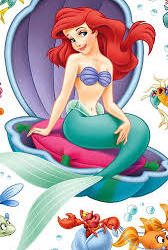
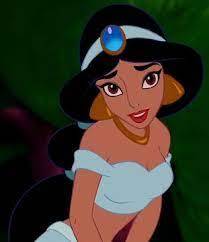
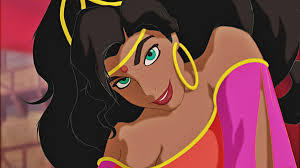

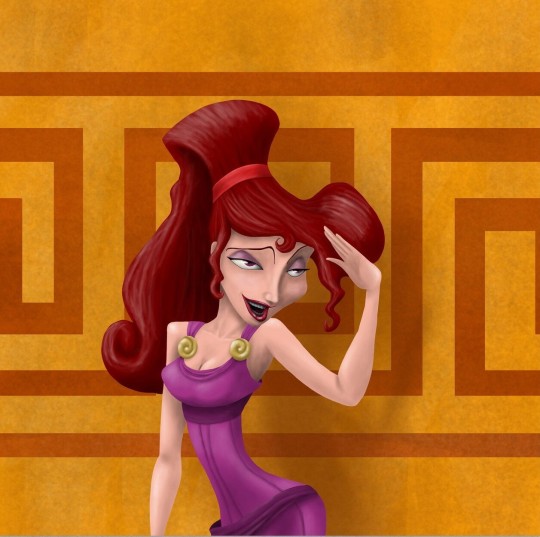
0 notes
Text
x
#@ anyone who thinks the whole bg sug*r d*ddy things w the cosmetic surgery thing is.....funny#rethink urself and maybe dont talk about womens bodies#especially dont talk about women's breasts and men's objectification of womens bodies#as if its a funny thing#this dude is misogynistic and entitled#and nothing bad about B#justifies rampant sexism towards her :-)#so like....uh....kindly.....shut the fuck up w ur jokes
1 note
·
View note
Text
Patriarchy and Pop Punk
Written by Theresa Cambe. Graphic by James N Grey

Yes, misogyny exists in almost every genre of music. Rap and country are usually at the forefront of this conversation, however, today we’re going to dive into the misogyny in pop punk. Lets face it, the misogyny is just covered up with layers of nice-guy, sad boy introspection but deserves the criticism just like everyone else. Just because a man holding a guitar gets vulnerable for a second, it doesn’t mean he is exempt from possessing misogynistic tendencies.
Despite the sexism built into this genre, I am more than guilty of partaking in my fair share of pop punk music. I would try to be at every State Champs, Neck Deep, Real Friends, The Story So Far, and every band of the sorts in between, concerts in Southern California between the ages of 14-16. I finger pointed and yelled those angsty lyrics right back at the bands while crowd surfing towards the stage in whatever sweaty venue in LA they happened to be playing at the time. I bought the merch, I hung their posters up in my room, I reblogged their concert pictures on Tumblr, I was about it. And trust me, “No Good” by Knuckle Puck could come on shuffle again and have me passionately screaming the lyrics while driving alone in my car around my god forsaken hometown (but I love my hometown, contrary to the popular sentiment). However now, I am more conscious of its problems.
I think this is the case for many other non-male enjoyers of this music when they also recognize its misogyny. Of course, there is nothing wrong with enjoying pop punk nor do I think enjoying this music makes you a bad person or inherently anti-feminist. A good portion of the demographic for these bands are women. With this large and important part of the fan base, we should start considering the safety of the environments and attitudes they create.
The attitude of misogyny and objectification is built into the foundation of pop punk. It is apparent in whichever “wave” of pop punk you want to point to. Early Blink 182 and All Time Low music videos had women in them to be silent sexual objects parading around the rock star band. There’s Weezer’s infamous sexist, nerd-rock anthems. “Thank God for Girls” sings “Called upon to employ your testosterone / In a battle for supremacy and access to females glued to the TV”. In a Genius lyric annotation of the song, lead singer of the band, Rivers Cuomo himself wrote “I’m so jealous of the hooker-uppers. Seems like it’s so easy to get laid now. All these good looking athletic guys are getting so much free sex. It kills me. Such a bummer. Such a bummer. To be evaluated by women. To be graded. To be rated. Where do I stand? How big? How strong? How enduring? How energetic? How inventive? So sad that it comes to this. So sad. It IS a competition and I AM being compared”. It is really quite ironic that Cuomo writes this but in the same breath has lyrics “The thing I finally found with these other girls in town / She got hot, and they did not” from the song “The Girl Got Hot” and also “You come like a dog when I ring your bell / I got the money and I got the fame / You got the hots to ride on my plane” from the song “The Greatest Man That Ever Lived”. Then there’s also every song on the album Pinkerton that we don’t have time to get into. Even if this self-deprecating behavior is no surprise from Cuomo, it’s concerning and rooted in some serious hate. If you want to argue that it's all satire, they’re still weird thoughts to have.
I can go on about these recurring lyrical themes. For example, there is The Story So Far’s song “Roam” with the lyrics “I know where you’ve been, you’re ruining men, never again will I let someone in”. And the classic from “Mt Diablo” that sings “Do you look at yourself straight in the eyes and think about who you let between your thighs?”. Then there’s FIDLAR’s song “Whore” which as we can expect from the title, says “Why did you go betray me? / You’re such a whore”. Then there’s the mess of “Me vs. Maradona vs. Elvis'' by the band Brand New, which writes “I got desperate desires and unadmirable plans / My tongue will taste of gin and malicious intent / Bring you back to the bar / Get you out of the cold / My sober straight face gets you out of your clothes.” Look into any corner of pop punk and you’ll find these questionable attitudes, but I digress.
These men play the nice guys and aim at making you believe he is the protagonist in every situation. The commonality between all these artists is that they obsess and fantasize over a girl then turn completely sour once rejects them or leaves a relationship. They want a “cool girl” to listen to underground music and really comfort their sad, misunderstood selves but won’t allow them to make a decision outside of his own benefit. Because god forbid these women have their own thoughts and exercise their own actions! Their fantasy is essentially a manic pixie dream girl that doesn’t speak or act out against anything. These men beg to be at the center, and get aggressive when they aren’t.
This is not to be confused with writing a sad song after you got broken up with or hurt by someone in a relationship. This is also not to say that all women are exempt from having toxic behaviors or from being written about. The guise of the patriarchy also harms those it seeks to benefit and therefore enforces rules of masculinity that restricts men from expressing their frustrations and emotions. I believe that writing music about unrequited love or difficult feelings is a healthy way to combat these roles. However, there is a major difference between processing rejection and hating women for rejecting you, which is an area many of these men seem to blur together.
I still have love for these bands and this genre. I can still go to their shows and have the time of my life, easily. But it wasn’t until I got a little older and more realized with my femininity did I revisit these songs and wake up to the fact that it might have not always been in my favor . I was probably too young to notice or care and was distracted by the catchy, yelly tone and how fun it was to jump around to that I never really sat with what some of the lyrics really meant. It was a major factor in my own internalized misogyny back when I was in the throes of it all. I didn’t want to be like those awful girls that these pop punk dudes kept singing about. They were always described in such a terrible way, that all they do is betray and backstab people. They wanted a “cool girl” to understand them and not be like them. So I rejected femininity and disliked other girls as if I’m in this sort of competition for the sad band dude’s attention. I was idolizing these men whose music mainly centered around their disdain for the women they had experiences with so much that it stuck in my brain that I shouldn’t be like them, that I should be appeasing these people I look up to. But I’ve grown to realize that I was only hearing one side of the story. It was a straight white man’s voice constantly, no one else. This one sided narrative created a false perception of reality, one rooted in a sad boy victim complex, that women are the enemy that shouldn’t be trusted because they couldn’t fit the weird male fantasy these dudes possess. Rarely are women represented in this music except through the lens of a man, which as we saw is almost always disdainful or as a character rather than a fully realized and autonomous person. Women are portrayed as commodities to obtain. It alters our perception of reality.
But with most things you love, you want to see them get better. This music has a fond place in my heart and signifies a really fun time in my life where I found my love for music and concerts. But the genre and the spaces it creates has its own set of problems that I want to see improve.
We have to realize that music has a greater impact on culture. The attitudes that create the genre of pop punk affects the audience that consumes it. The one-sided narrative they build implants harmful ideas about relationships and dynamics into their young fans, as it did to me. Regardless if you want to say lyrics are just lyrics and are meant not to be taken so seriously, artists have so much influence on their fans. They are perpetuating the nice guy narrative that men are owed something from women. And sometimes we unfortunately see this point of view reflected in these band member’s actions. The accusations against them for sexual assault, grooming, and manipulation of young girls runs rampant in these spaces and remains to do so. They abuse their positions of power and influence. Using self-pity in songs does not excuse the shitty things you do.
1 note
·
View note
Note
14, 22, 24, 26 👀
Oh Hi thereee!! Thanks for the ask 💓💓
14. Do you enjoy your country's cinema and/or TV?
To be very honest no😬😬 we are still a very conservative patriarchal country and i find a lot of it very very problematic (i hate this word but yea). Most of the material consists of the objectification of women, sexism, homophobia, and other awful stuff. I am considered a bit radical here, my friends would often surprised by my standpoint on these topics, but idc. Even if there are some good movies or TV it's probably like 5%. It is that bad lol at least to me.
22. What makes you proud of your country and what makes you ashamed?
Indonesia is known for its nature. The nature is breathtakingly beautiful!! We have everything from mountains, jungle, tropical beach, savannah, even Snowy mountain! Hence we have so many TV program about travelling ✌ one of the most famous is probably Bali but tbh it's overrated, go check out Sumba, Labuan Bajo(you can only see Komodo here), Yogyakarta (I used to live here and oh boy... I felt like I was right where I want to be)
Ashamed of? Oh gosh where do I start? I would say the politics and goverment! It is better now but still shit. Corruption collution and nepotism are still rampant here. Also the celebrity culture is just 🤮🤢 I am not smart enough to make a coherent sentences to criticize it. It's a freakshow, literally a nightmare. The crime rate is still very high, I hate to say this but esp. if you are a women you have to be extra cautious :(
24.what other nation is joked about most often in your country?
I think it's Malaysia. South East Asian tend to have similar culture, so there are so many conflicts between Malaysia and Indonesia regarding cultural thief? Appropiation? Even territorial breach. Indonesians give it the nickname 'Malingsia' (The Thief that is Malaysia). I lost count of how many of our original traditions and culture that were claimed by them. Ex. Batik
26. Does your nationality get potrayal in Hollywood? What do you think of it?
Because we are very very diverse, it is sometimes tricky to portray us correctly. But as far as I know, they mention Indonesia a lot when it comes to 'exotic places'. I remember this Anaconda movie set in Kalimantan tho lol
We have literally hundreds of ethnic groups lol it can be confusing (these people look like they're all from different country right? 😅)




I'm part of the below right ethic group btw (Tobanese)
Anywayyy im so sorry because this answer is too long! I get carried away hehe
0 notes
Note
Do you consider yourself a radfem? Are there any aspects of radical feminism you disagree with?
Yes, I now mostly align myself with radical feminism (i don’t consider myself feminist since I am not an activist). I go back and forth sometimes, in terms of considering myself one- none of the doubts have to do with theory itself, but radical feminists themselves**.
But even before I knew of radical feminism, feminism even, my theorizing/understanding of the world based on my very own experiences and observation of the world, observation of women i knew, was aligning with radical feminism. For instance, I had early views on marriage, why women got married (e.g., as a kid i thought it was because women were forced which isn’t entirely wrong), i was bothered that women were birthing kids and taking care of them but they were named after the father who lounged around, i was bothered by what i learned of sex when i learned of sex. I always viewed pornography as objectification (though at first, my view was religious in origin). And even as a child, I was bothered by gendered prescriptions in Islam (as a child, it was divorce and inheritance). I also, from the beginning, have believed in a kind of a common experience of being female which was apparent to be upon talking to any woman, and reinforced whenever i talked to any man. All this to say that I believed in some kind of sex-role conditioning, with women viewed as lesser to men. I later learned that there was a name for this line of thinking, and the analysis that was associated with it.
Once I learned of radical feminism, at this point i was between Marxist feminism and radical feminism. But eventually, it became apparent to me that Marxist view assumes that the only hierarchies/power imbalances are economical ones. And that if capitalism was abolished, you’d still have men oppressing women, because men would have a vested interest in oppressing women outside of serving the capital. Also, it just became apparent that patriarchy was as old as time, so pre-dated capitalism, as in, patriarchy isn’t the consequence of capitalism. Though I would concede that patriarchy does have different forms, and strengths over history. And that capitalism has made patriarchy much more virulent.
Marxists frequently also come short on their views of prostitution where they think that in a communist society you would have ‘sale of sex’, which is inexplicable given marx, but also not surprising given what I just said above- that they don’t analyze men as a class. Eventually I did learn the history of radical feminism (in usa), and learnt that it was a reaction to the rampant sexism of the left in the 60s so early radical feminists were marxists trained in the civil rights movement but then criticized the left from the left, and decided that women’s liberation must stand alone and produced their own work and theory. So that all also eventually clicked into place as well because I use to wonder why marxists were so sexist and would refuse to extend their criticisms of capitalism to prostitution.
There’s also socialist feminism (early 70s which I maybe could have been on board with), and evolution of socialist feminism into a newer form of feminism called materialist feminism. Both these branches of feminism consider both patriarchy and capitalism as factors in women’s oppression. But materialist feminism is much too post-structuralist in it’s deconstruction of sex, which in my opinion is an entertaining read though thoroughly divorced from reality, and is only good as a new hot take thought experiment. All of which has its rightful place in leftist academia.
So that is why my views fit mostly in radical feminism, because of my belief in sex-based oppression of men as a class over women. **In terms of disagreement, though I am against organized religion and of course Islam falls into this category for me, I take issues with the way radical feminists approach it. It just frequently reeks of racism and they just don’t give consideration to western imperialism. This happens also with other matters involving racialized misogyny. I think radical feminism would benefit greatly from inclusion of more brown and black women. But unfortunately, though I find most brown and black women have radical theory, they don’t want to associate with radical feminism.
19 notes
·
View notes
Text
Woman Women feminist shitstorm begins: theater bars men from screening of Wonder Woman movie because "girl power"
The upcoming Wonder Woman movie premieres June 2. The movie actually looks like it may be okay. The problem is that Wonder Woman, as perhaps the most widely known superheroine (especially by people who don't read comics), has always been a lightning rod for gender politics. Case in point, Alamo Drafthouse in Austin, Texas has decided to host a "women's only" screening of the film because "girl power":
"Apologies, gentlemen, but we’re embracing our girl power and saying “No Guys Allowed” for one special night at the Alamo Ritz. And when we say “People Who Identify As Women Only,” we mean it. Everyone working at this screening -- venue staff, projectionist, and culinary team -- will be female."
I'm still trying to figure out if this is illegal. I would be one thing if this was a private event for a organization that just happened to be all women. However, its quite another thing to have a public event that specifically bars a specific people group. I see little difference between having a "women's only" showing and a "whites' only" showing.
Not only is the theater discriminating against customers based on gender, but possibly also employees. If they told any male employees they couldn't work during the screening, those employees would have legal grounds for a employment discrimination complaint under Texas labor laws.
I also want to say its a stupid business decision to bar half your potential customers for no reason, but the tickets seemed to have sold out! There is even talk of setting up more women's only screenings. Plus they are getting a load of free publicity.
Drafthouse's Response
Alamo Drafthouse has responded to very credible allegations of sexism with mostly with either dismissive or outright snarky social media comments.
This isn't a matter of opinion. This is subjective gender discrimination. The only possible argument you can make is this is some how okay gender discrimination.
I don't want the Drafthouse to burn in hellfire (unintentional Marvel comic reference there). In current American society, sadly few people recognize that sexism against men is even possible. I could imagine the Alamo Drafthouse unwittingly walked into this. However, they lose my sympathy when they double-down when they should be apologizing.
I also simply don't understand what the draw is for women here. I don't necessarily agree with women's only gyms or "ladies night" discounts, but at least there is some sort of argument there. What's the attraction here? See a movie without having to suffer the presence of men? Is the spectre of "ra-ra" sisterhood so intoxicating, no matter how ridiculous and unnecessary its form?
I think what really frustrates me about the whole thing is that is just seems to be sexism for sexism's sake and women are paying a premium for it!
Women's Women is a lightning rod for gender politics and SJW crap
Wonder Woman frustrates me because she is a mainstay of the DC Comics universe, but I think she has always been held back by both gender politics and bad writing. I think the writing has actually been getting a little better for her. While DC fans generally hated the New 52 reboot, it played up some complexities in Wonder Woman that made her more own character and less Superman with tits. Brian Azzarello's New 52 Wonder Woman run, while not perfect, was probably the most interesting take on the character I've seen for awhile. It also occasionally poked fun at the gender politics of the series and a few times out-right slapped them across the face.
However, you also have Grant Marrison's ridiculous Wonder Woman: Earth One, which includes unnecessary references to both body shaming and racism (along with some of the weird BDSM stuff found in very early versions of Wonder Woman). We have an issue of Sensation Comics, where Wonder Woman explains even her magical Lasso of Truth "can't stop mansplaining".
Wonder Woman has become a feminist icon simply because she is the most recognizable female superhero. Gloria Steinmen famously complained about a story arc where Wonder Woman lost her powers. But how much Wonder Woman do you think Steinmen actually read? Do you think she knew any other female superheroes? As the recent SJW incursion into comics has made it clear, SJWs care more about the political statements they can make with comics, rather than the medium itself. I have a feeling that feminists would rather Wonder Woman be a good feminist billboard, then a good (much less financially viable) character.
Wonder Woman is actually a confusing choice for a feminist heroine if you bother to dip below the surface of the character. For one thing, Wonder Woman was created by a man. A man who appears to have wanted to use her to promote BDSM.
Sure, feminists will likely drool at a super-powered warrior princess from an all-female island paradise battling evil (which they may easily reinterpret as "patriarchy"). However, I doubt that many consider that the "Paradise Island" (aka Themyscira) Wonder Woman hails from is a highly militaristic, isolationist, xenophobic, theocratic, misandric, dictatorship (technically a monarchy, but the queen is immortal). It might even be outright authoritarian. Women aren't generally allowed to leave the island. Men are generally forbidden from setting foot on the island (sometimes on penalty of death).
Furthermore, while feminist dogma sometimes gets pasted on to Wonder Woman, Wonder Woman is very often the force pushing for greater understanding and contact with "man's world", occasionally even bringing male heroes (often in violation of the island's laws) to Paradise Island. Wonder Woman is the bridge between our "man's world" (which actually isn't just man's world) and her island, which is why Alamo Drafthouse barring men is particularly ironic. It's probably the most un-Wonder Woman thing you could do.
Frankly, feminist don't even know what to think about Wonder Woman. The U.N. adopted Wonder Woman as a mascot late last October. When Wonder Woman became a U.N. mascot last year (I suspect as a face-saving measure when they failed to elect a female U.N. Sectary General), many feminists were outraged. A petition with 44,983 signatures was submitted to remove Wonder Woman. One of their complaints was that a real women should have been used, but I think they were mostly upset that Wonder Woman was "an overtly sexualized image" at time of supposed rampant "objectification of women and girls".
"Although the original creators may have intended Wonder Woman to represent a strong and independent “warrior” woman with a feminist message, the reality is that the character’s current iteration is that of a large breasted, white woman of impossible proportions, scantily clad in a shimmery, thigh-baring body suit with an American flag motif and knee high boots –the epitome of a “pin-up” girl."
Ultimately, the U.N. dropped Wonder Woman after just 2 months.
This hasn't stopped Gal Got from telling us that Wonder Woman is totally a feminist movie, mostly because Gal Got has no idea what feminism actually is.
"GLAMOUR: [..] Does portraying one of the most iconic feminist figures change your own personal feelings on feminism? GG: There are such misconceptions as to what a feminist is. Feminism is about equality. I want all people to have the same opportunities and to get the same salaries for the same jobs. I realize I'm doing what I want to do because of the women before me who laid the groundwork. Without them I wouldn't be an educated working mother who is following her dreams; I wouldn't be here."
It's Got who is has misconceptions about feminism, which is definitely not about gender equality, but actively promotes inequality.
Get ready for a feminist deluge
I'm holding out hope the Wonder Woman movie will actually be mostly good (probably not great, but good). Although the WWI setting makes me think we'll probably get a reference to the Suffragettes, which would be strange since women can't vote on Paradise Island either. I doubt the movie will comment on the Suffragette's largely forgotten racism or acts of domestic terrorism (or note how many men couldn't vote at the time either). I would love to see someone try to explain the White Feather Campaign to WWI era Wonder Woman.
However, we are definitely going to get a deluge of feminist commentary on the movie. Three months from the movie's release Wonder Woman's arm pit hair was already a point of controversy! Hundreds of feminist blogs will use the movie as a springboard to talk about feminism. Feminists act like the fictional movie some how proves feminist doctrine. Feminists will complain about other feminists commentary because Wonder Woman is white, able-bodied, and attractive. Feminists will analyze the ticket sales. Feminists will make seeing the movie a political act and not seeing an act of misogyny.
On the other hand, if Wonder Woman was even mildly anti-feminist, it could be one of the greatest anti-feminist trolls of all time.
More Stuff
MundaneMatt: Male fans upset at (possibly illegal) female-only WONDER WOMAN screening
Diversity in Comics: WONDER WOMAN will play in gender-segregated theaters
67 notes
·
View notes
Text
Distract and Subvert
With the advent of Zoe Quinn releasing a book on her experience with GamerGate, and I can’t stress the “Her experience” part, I wanted to weigh in on the situation. To be honest, I was ignorant of Quinn outside of her role in exposing the way gaming media conducts its sordid business. I legitimately knew nothing about the harassment or whatever she had received, just that she was a sh*tty girlfriend that slept around on her dude, for nothing more than high marks of her sh*tty games. Anita Sarkesian is in there somewhere but I don’t know how. The gist of what I took away from my initial foray into GG was that there was wild corruption and conflict of interests within the gaming journalist communities. I’ve seen several videos about this and read even more article. As a gamer of some 30 years (I am old as f*ck), I knew that the industry was a little bit of a boys club in the regard. It made sense that gaming companies would placate reviewers with this and that. If you’ve ever worked at a GameStop, you saw this firsthand. I did. Swag days were the best! So Imagine my surprise when, as I dug further into this story, it morphed from the very real issue of ethics in gaming, to some wild ass third-wave feminist, quagmire.
Now, before the pitchforks come out, i want to say, I am, unequivocally, feminist. Just not this sad internet feminism that has saturated everyday media. My ideals stem from the fact I was raised by a bra burning hippie turned overworked mother. I watched her toil in her profession while people with much less experience, male and female, were promoted over her because of connections, looks, or penises. I spent ample time with my grandmother in her mountain residence, a place I considered a refuge from my abusive ass home, where I learned culture, commerce, and free thinking. Admittedly, my grandma was probably a witch but that aspect of who she was just made her all the more well-rounded I think. These women shaped my perception of what it meant to be a woman in America. What it meant to have to exist in a male dominated world. And it was sh*t. I knew that at 5 years old. I wanted more for my mother. I wanted more for my grandmother. I wanted more for all women in the world. I am a card carrying feminist raised by strong black, feminists. I legitimately don’t understand how women are treated so poorly. How can we belittle the women in our lives so aggressively? They’re our mothers, sisters, cousins, wives, and more. They’re partners in this thing we call life. Why are we treating them so differently? Why are we treating them as commodities instead of the vibrant creatures they truly are?
I would just like to reiterate, however, I find third-wave feminism to be ridiculous and often far more problematic than helpful but that’s a discussion for another day I think.
As I did my research and learned more about what GamerGate became, as opposed to what it started out as and should have actually been about, I found myself disgusted. Not with the perceived chauvinism or attacks against Quinn, but with the way the media so transparently tried to shift focus. Within a week, the issues brought up about the ethics in gaming journalism were lambasted into some big ass patriarchal conspiracy. And instead of reporting on the facts that certain individuals n the journalist community exchanged sexual favors or monetary bribes for advantageous reviews and articles, we get “no more ghurls in m’ games”! The speed of acceptance by the media spin was insane. Actual publications like the New York Times, not just IGN or Otaku, were publishing articles about the toxic nature of the gaming community towards women. The vast majority of these articles were written by the very same people the initial inquiries of GamerGate were trying to expose! Almost everyone missed that through and, instead of taking a good hard look at what it mean to be a journalism not just in gaming but in general, we get the villainizing of the male gamer, BY GAMING JOURNALISTS!! Literally, gamers call bullsh*t on your bullsh*t tactics, and in response, you use those same bullsh*t tactics to essentially divert attention from the fact they called you out on your bullsh*t to begin with!
I do believe there is a problem with the gaming community but that needs to be taken with a grain of salt. A lot of these aggressive assholes online are in the minority, they just have the loudest voice. The same could be said about and visible “movement”. No one wants to report on the intelligent debate because that’s not sensational enough. No one wants to talk about how things are actually improving in the gaming space or how we as a demographic are exceptionally welcoming as opposed to something like music or Hollywood. Yes, there is a very loud, very vocal minority that most people outside of the gamin culture take to heart. That gatorade douchebag playing COD that bashes women and teabags his opponents constantly or that fat, zitty, neckbear who’s playing some random RPG in the cold recesses of his mother’s basement. Those people exist, sure, but they’re not all of us. They are the problem though. It’s these type of people that the mainstream media focus on. It’s these characters that end up labeling and perpetuating suck ire from everyone in society who doesn’t game. It’s these characters that people like to focus on to villainize an entire culture. It’s the equivalent to saying all Muslims are terrorist even though the vast majority are not. Or that all cops are bad even though the vast majority are not. And while that demographic of gamer is very loud, there are those of us decrying, just as loud, their actions but no one reports on that. The mainstream media pretends that the counter-voice is a hushed whisper because everyone wants to watch a crazy person be crazy. It’s that “he is NOT the father” mentality that permeates out society and it’s bullsh*t.
In my experience, the gaming community is very inclusive; very welcoming, even if your point of view runs contradictory to the overall consensus. Where else can someone like a Zoe Quinn or an Anita Sarkesian even find an outlet for their preferred voice, as problematic or volatile as they can be. Let them try that sh*t in the Hollywood arena. They’d be mercilessly drowned out in second. But, within the gaming community, they’re allowed their voice and perspective. And admittedly, some of their arguments are legitimate, albeit embellished. For every cheesecake representation of the female form, there is one that is equally strong and compelling. For every Princess Peach, you have a Samus Aran. For every oversexualized Tifa Lockhart (a personal favorite of mine, by the way) you have an equally compelling Aloy (Another favorite of mine). I don’t think it’s a huge issue that DOA: Beach Volleyball is a thing. I do believe, however, we need more games like Horizon that showcases the strength and willpower of a strong female character where the polygon count in her bust isn’t even an issue to begin with. Women protagonists don’t always need to be sexy spies, or sexy ninjas, or sexy anything. We need to better represent a realistic female voice in our games. That doesn’t mean you have to adjust the polygons to look like Lena Dunham instead of Scarlett Johansson. Female characters can be every bit the badasses the male ones are, and still be considered classically or ideally attractive. And if you don’t believe so, go make a f*cking game reflecting that. That is the beauty of the gaming industry; Anyone can create whatever they want as long as they have the tools to do so. So stop complaining and point fingers. Get out there and create the change you want.
I got a little sidetracked from my initial point but I felt elaborating on those two points, the toxicity of the online gaming community and perceived sexism and objectification of women in gaming, were necessary to clarify my position on the overall Gamergate fiasco. I’ll probably write at length about their issues at another time but my point in all of this is, look what just happened. I wrote about two polarizing topics within the community right now and you’re feeling some kind of way, most likely. That’s exactly what happened with Gamergate. That’s exactly what these “Journalists” did. By deflecting their responsibility for their sh*tty actions, they created and entirely different beast. A rampant monstrosity that is poising the culture as a whole. Instead of taking the call to heart, these assholes desired to attack, and we’ve been wounded ever since. Should those discussions about sexism and abuse have happened? Absolutely. But definitely not in the toxic, antagonistic nature that they are being shouted about now. What started out as a call for accountability from the gaming community toward the gaming journalists, turned into a crusade against women by those destructive stereotypes of gamers, designed by gaming journalists to deflect the initial call for responsibility and reform. Now Zoe Quinn is releasing a book, in partnership with Anita Sarkesian (you had to know they would find themselves into this situation even more so than they already are) that will probably change the narrative further, shifting focus even more from the core issues we all wanted to showcase.
Let me be clear:
What happened to Zoe Quinn was sh*tty and no one should have to deal with that, period. Regardless of how you feel about what she did beforehand, how she went about promoting her game, or who she did or didn’t sleep with, Zoe Quinn did not deserve the vile treatment she received.
While believe Anita Sarkesian is a detriment to both feminism and gaming over all, I understand and accept the fact that the conversation she started needs to be had. Even if Sarkesian’s way of talking about it might turn off a lot of people, myself included.
We as a community need to be better at calling out the bullsh*t we see be it hypocrisy, abuse, harassment, or the like. It’s not a boys club anymore. It’s an entire living culture that has ebbs and flows. We need to accept hat and open ourselves up to growth. The old ways should be left in the past and newer, better ones created was we move forward, together. Vagina and penises, alike. Or, you know, whatever you identify with.
Gamergate was never a “it’s me or them” situation that i turned out to be. It was a legitimate movement to change something that had been crippling the growth of our community for years. What it turned into was something even worse at the hands of the people who we wanted to change by shining a light on there shortcomings. Instead of accepting that criticism and look inward as a means of self evaluation, they lashed out at the very people who support them. Distract and subvert; a model on destabilizing whole countries that is actively working in America as we speak. The insidiousness of this shift in message perpetrated by those already branded guilty was incredible to see. These people would do anything to preserve that status quo. The episodic nature and ultimate dismissal of the core issues within Gamergate are, in themselves, the problems that gave rise Gamergate in the first place. The fact that no one seems to want to acknowledge any of this is completely wild to me and indicative of symptoms proving that the problems will continue. As long as we in the community continue to fight about polygon tits and 12 year old assholes, the real issues will ever find resolution.
1 note
·
View note
Text
Media Report #1
Media selection: http://www.huffingtonpost.ca/2014/08/08/american-apparel-skirt-photos_n_5660594.html

Introduction
The media I have chosen are commercial advertisements and corresponding images produced by American Apparel, of which could be uncovered in/on magazines, billboards and posters, electronically via email and social media, and television. The article on the matter addresses specific “up-skirt” photographs in a back-to-school advertising scheme by American Apparel (see link above for the article). This selection coordinates with this week’s reading assignments by provoking discussion of misogyny, sexism, and women’s liberation in addition to what influence these advertisements have on viewers and members of society. Particularly, coinciding of the marketing of sex with the ways actual people arguably are negatively affected by this gendered portrayal of school girls and the way they are to be perceived and treated.
These advertisements and images alike were produced by advertising agencies under American Apparel CEO Dov Charney, CEO of the company then a consultant of their board in 2014. American Apparel brands itself as materially U.S.-based and sweatshop-free while advertises its clothes with, often, images rampant with sexualization and objectification of its male and female models. To provide context for the deployment of the advertisements in the U.S. and U.K., this CEO was fired twice from positions in the company for “misconduct [involving] sexual harassment” around that time (Alesci). This past owner of the company, when ousted from his position, promised his return to the business (or a similar venture), not acknowledging the controversy of his socially deemed wrongdoings in and outside of his business.
Interpretation
The target audience of the clothing appears to range from preteens and teenagers to late thirty-year-old individuals, with special emphasis (due to the typical age-appearance of the models in the advertisements and employees on the floor of the stores) on teenagers and early twenty-year-olds. I think the advertisements themselves are conveying to their audience messages of freedom of expression and sexuality, and a free fun youth to its audience, but above all catching the viewer’s eye and selling products with sex. The Huffington Post article, on the other hand, communicates the potential negative effects (particularly for women) of advertising with these “up-skirt” images of seemingly school girls (putting aside the unknown actual age of the female models) and the backlash on social media immediately following the deployment of these advertisements in mainstream media. The highly sexualizing and objectifying content, and its implications, are controversial in even Western cultures for the potential ramifications on (young) women and their safety, fair and equal treatment and judgment by the self and others, and general quality of life. Also, that the nature of these school girl depictions, typically considered unethical, are here normalizing of material openly pedophilic or pornogrpahic.
Specific messages of gender identities communicated here is not that of gender fluidity and the breakdown of related boundaries and categories, but of the dependence on the gender dichotomy for one’s place, role, and expectations. Of course, inclusive of how people ought to feel and appear physically. Here, women are sexual and promiscuous beings, naturally it seems in the way that women, not men, are presented this way across all the advertisements. Men, even when promiscuously garbed, are often standing up rather than sitting, leaning, or crouching beside another figure in addition to acting in control or dominating in sexual images (here the theme of women as objects and men as subjects appears). Portrayal of women in the media like this conveys aspirations and ways of being for women and men with undertones of misogyny and sexism in the way that social acceptance and praise (at least in some spheres) of men and women seem to differ to an extent, “[reproducing] norms of power and violence” (Devoss 842). Ageism and classism also come into play here as the clothing advertised to these young women as acceptable and desirable is exclusively for those who appear young as well as exclusively accessible by those of the middle to upper class.
Critical Analysis
On whether these images may be viewed as feminist or liberatory: there are many perspectives. For some, “instead of being used to enhance, resculpt, or rethink women’s bodies, [the images] are used to further control and regulate women’s bodies”, while others take the advertisements to be encouragement to sexually express and explore in ways that women were not once permitted or encouraged to do so (Devoss 837). Most likely the former would align with radical cyberfeminism while the latter would with liberal cyberfeminism for the images of gendered bodies and identities do not display gender fluidity or post-genderedness (Hall 148). In either case, feminists would agree that what it is to be a man or woman, and human, is culturally entrenched as tied to gender and so the images, while perceived as womanhood implicitly is in fact a cultural tool for imposing ideas of what it is to be, categorically of course (Sundén 217). Thus the body itself is inherently cultural as any other social institution or tool is for society.
I take the implications of the sexual and promiscuous images tied with women to be a conveyance that this is the way, and who, women are and ought to be treated and expected to behave as such. For the way women, and their male counterparts, are depicted in casual apparel like this must be the way they naturally are and an exhibition of their true roles. Female and males of the audience are caught in traps: for women, there is the pressure to be like a woman (in the traditional sense) and not be one (so, more liberatory), and for men the pressure to expect and praise one or the other type of woman and treat them as though this important distinction is to be followed (Sundén 229-230). In both cases, women and men are encouraged to disapprove and police into ostracization those who do not follow these ‘gender rules’. This internal prejudice regarding those who are or are not obedient to cultural rules, as written and rewritten in the media, leads to active and unconscious discriminatory behavior, different treatments intersectionally, and different (likely unequal) experiences and worldviews. I take the message overall, as a more liberal feminist, to be a negative one in the way that gendered notions are salient through the images in the media and so aid in the entrenchment of discriminatory cultural ideologies, though at the surface level I do not take issue with the sexual content and freeness of women in this respect.
As for the school girl images in particular, I neither find it troubling that women would choose to bend over nor promiscuously dress but that the images illicit a vibe of non-consensuality, as though the photographs were taken as women bent over on school property but not when they were attentive and accepting of the images being taken in the first place. Also, to show the schoolgirl bending over in a revealing way but not the person who is filming the incident is to facilitate a victim-blaming and rape culture in which the woman’s promiscuity is why the viewer is disturbed and uncomfortable with the image rather than due to the (invisible) photographer who distributed something typically deemed kept to the private sphere. This is of course not to say that a school girl could not possibly offer consent for the photographing or that this is culturally age-appropriate behavior by any means, but that this provides for confused feelings as regard women’s behavior in the public sphere rather than the perception, exploitation, and scape-goating of it by others.
The culture inherent in the media, and in bodies, presently disables feminism from enacting uncontroversial change because derailments from patriarchal misogyny are derailments from social norms. Images of content that implicate women’s freedom of expression and sexuality are unfortunately intertwined with all other taken-for-granted cultural understandings and so cannot be taken merely at face value. The destruction of cultural categories in technoculture is therefore a requisite in the rise of liberated sexual bodies and potential for new meanings of women’s liberation to be manifested (Sundén 219). Bodies are “inscribed, marked, engraved, by social pressures external [but are at the same time] direct effects, of the very social constitution of nature” and so bodies (228). What is womanhood and femininity, deviant and praise-worthy, feminist and patriarchal, and so on are determined by a culture, technology and bodies of which are not excluded from this. For one to spark the reinvention of the woman, body, human, and so on, one would first have to initiate change in the culture which ascribes meaning to people, which makes people significant entities or anything at all (Hall 147).
Discussion
1. Could masculinity and femininity have any part in liberatory depictions?
2. Could a focus on bodies have any part in liberatory depictions?
3. What do you see as the future of media portrayals of gender, or of people in general, assuming technology continues to progress in this way, and alongside capitalistic ventures? Does your ‘future world’ hold promise for individuals who are not luddites? That is, provide a space free of culturally entrenched biases and other categorically-based ideologies which systematically harm certain individuals over others? (Think back to “Deep Lab”).
4. In the same way that some are caused to feel uncomfortable with or threatened by images and the conceptualization of cyborgs, some are made to feel that way by liberated, sexually expressive and free, etc. women (whether in images, in person, conceptualized)? What do you think is responsible for this similarity?
Sources
Devoss’ “Rereading the Cyborg(?) Women:The Visual Rhetoric of Images of Cyborg Bodies on the World Wide Web”
Sundén’s “What Happened to Difference in Cyberspace?: The (Re)turn of the She-Cyborg”
Hall’s “Cyberfeminism”
http://money.cnn.com/2014/12/24/news/companies/dov-charney-american-apparel/
1 note
·
View note
Text
This is something that's been on my mind for a long time. Long ramble under the cut
TL;DR: Grazer-razor has some of the worst black and white mentality I've ever seen and I can tell he has never critically examined his biases a day in his life.
Because I'm a terrible little gremlin who can't leave well enough alone, I've been reading these posts
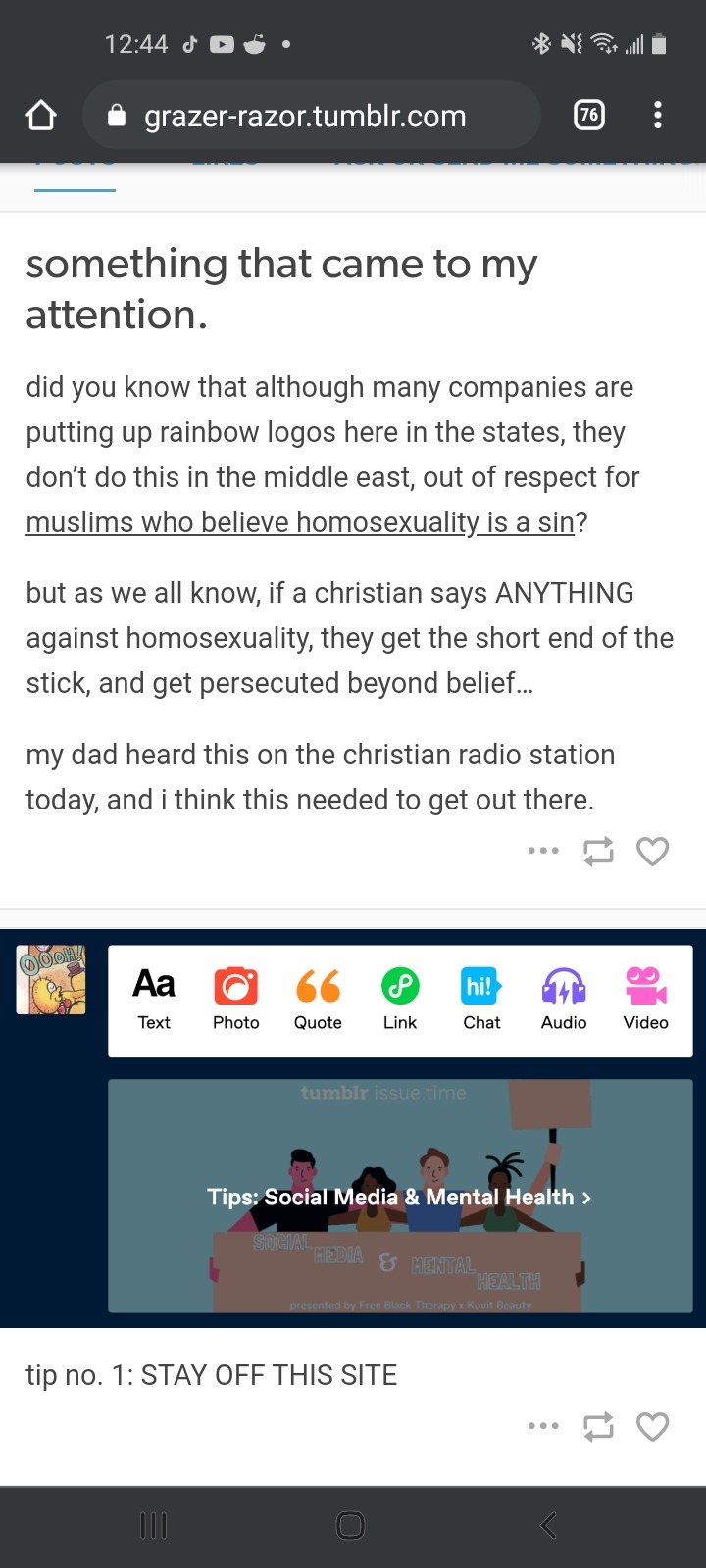
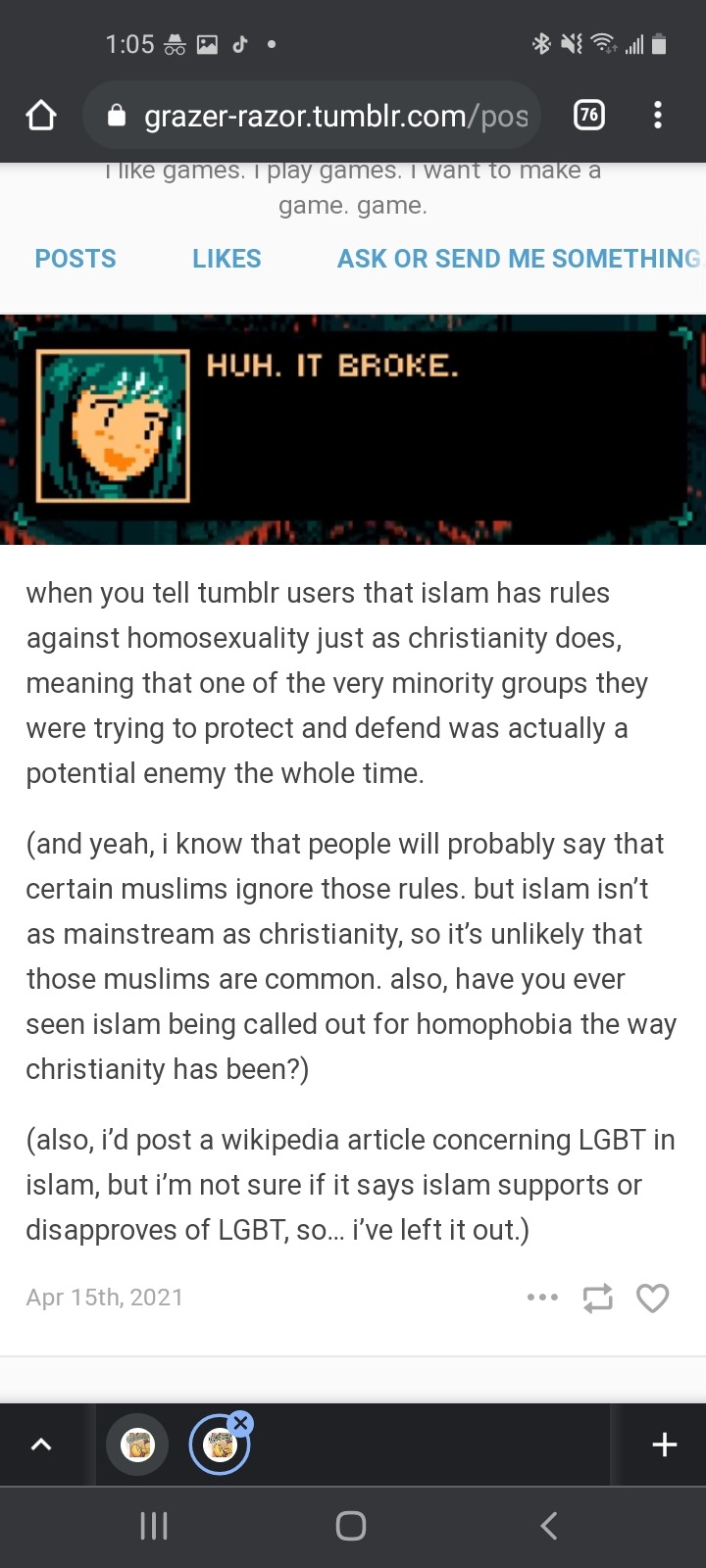
Ignoring the absolute stupidity of these statements (I'm pretty sure the lack of rainbow logos is because in many middle eastern countries, homosexuality is a crime and these companies just want to make money. But I'mnot going into the nuances and implications of rainbow capitalism today.), something stood out to me.
Does Grazer... genuinely think nobody has ever criticized the Muslim faith? That we all ignore the homophobia present within the religion just because they're a minority? Correct me if I'm wrong, but I've seen even some of the most staunch leftists criticize things like their horrible treatment of homosexuality or the rampant sexism often sanctioned by radicals. Even other Muslims, especially women and lgbt+ Muslims, have been critical of these things.
It wouldn't shock me if Grazer believedthat anyone who supports Muslims believes they can do no wrong. After all, he thinks any criticism of Christianity is hatred, and dismisses any harmful things Christians do as not being "real" Christianity in a classic case of the "No True Scotsman" fallacy.
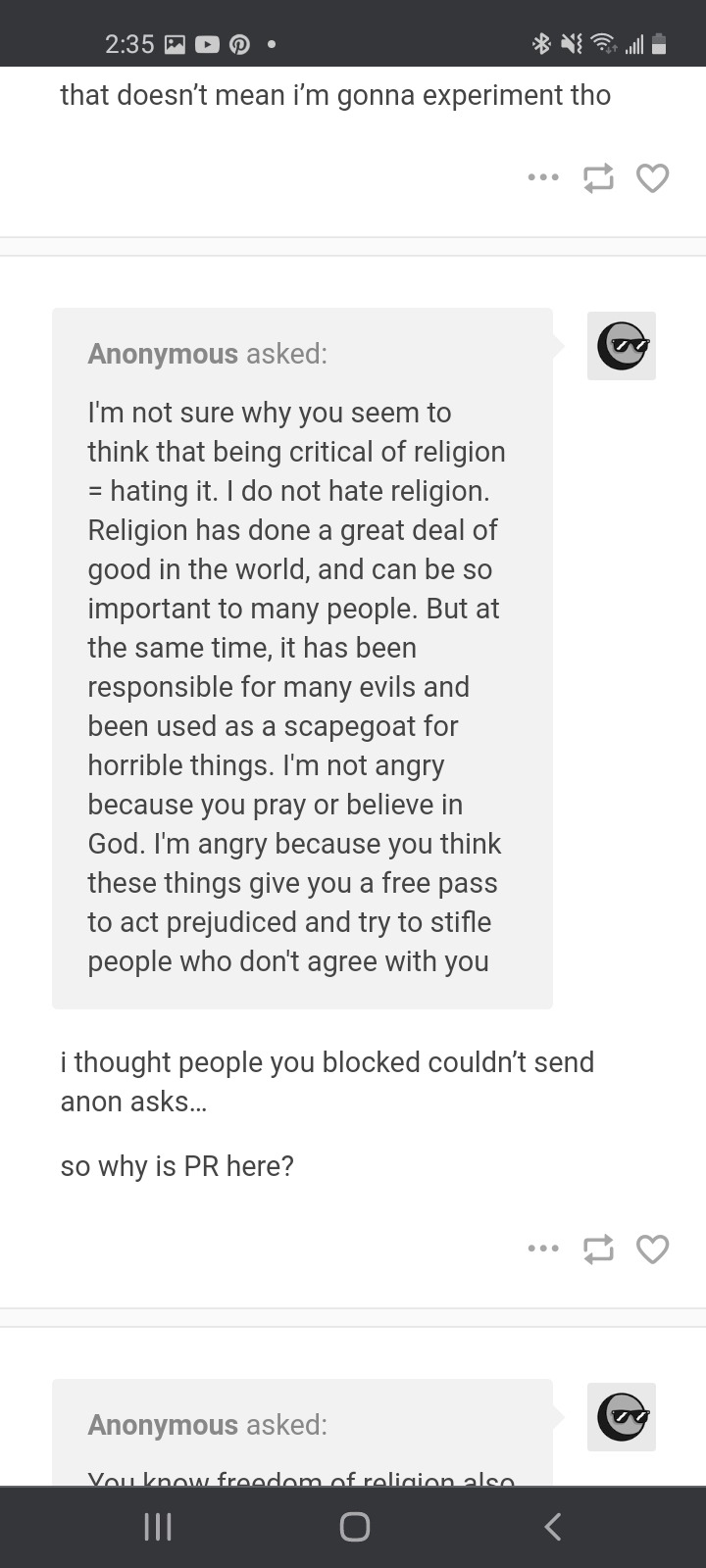
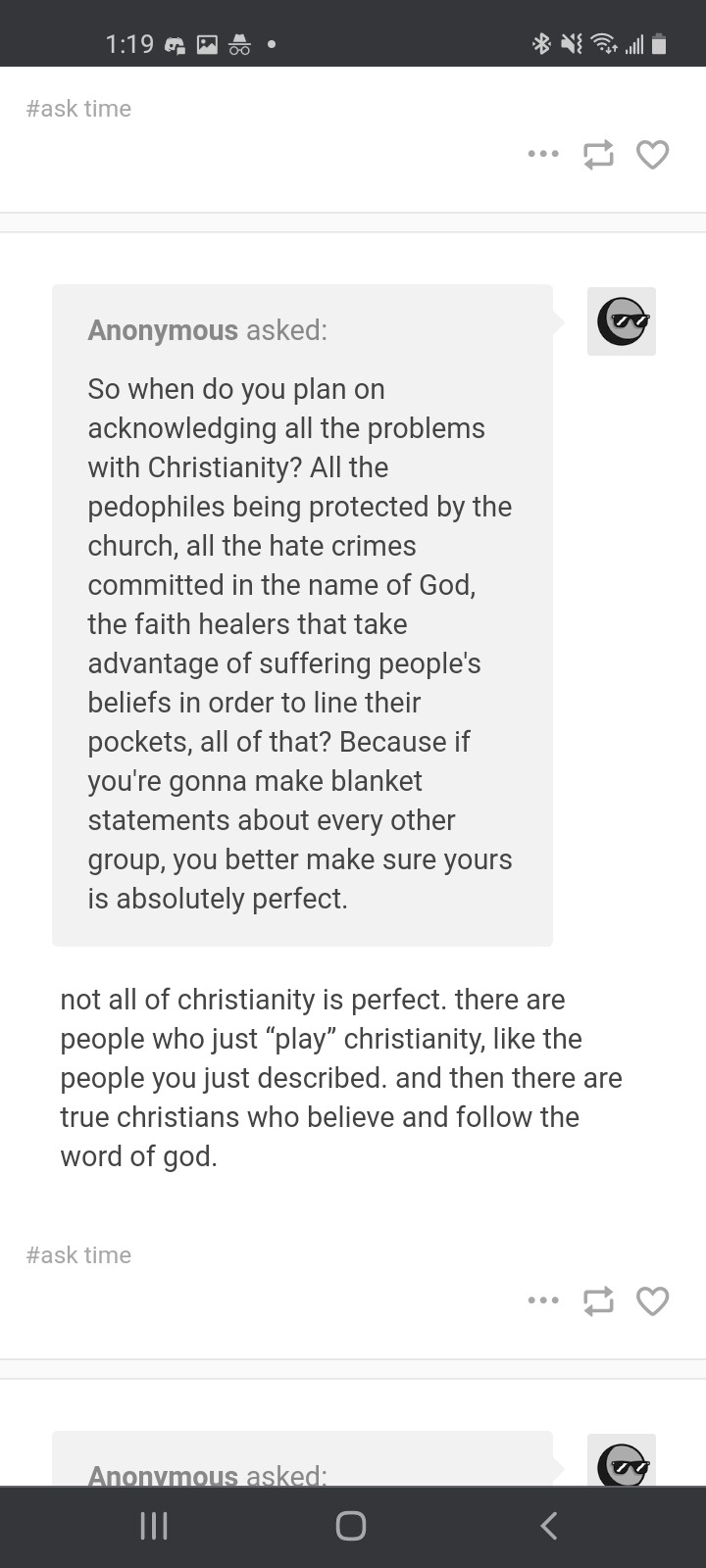
Note how he didn't even respond to the first asks comments, just accused them of being me (because obviously any time someone sees his blog it's all my fault /s)
So it seems like in Grazer's mind, there are only two options when it comes to religion: Uncritically praise and defend everything a religion does no matter how heinous it is and justify it because it's done in a God's name, or condemn anyone who practices it as hateful terrorists. Because he doesn't see people doing the former for Christians, he automatically assumes that they're doing the latter, and vice versa for Muslims.
Also note how he gets mad when muslim faith is "respected" (again, homosexuality is criminalized in many of these areas) but then demands a secular children's show cater to his religion for the sake of his precious childhood.
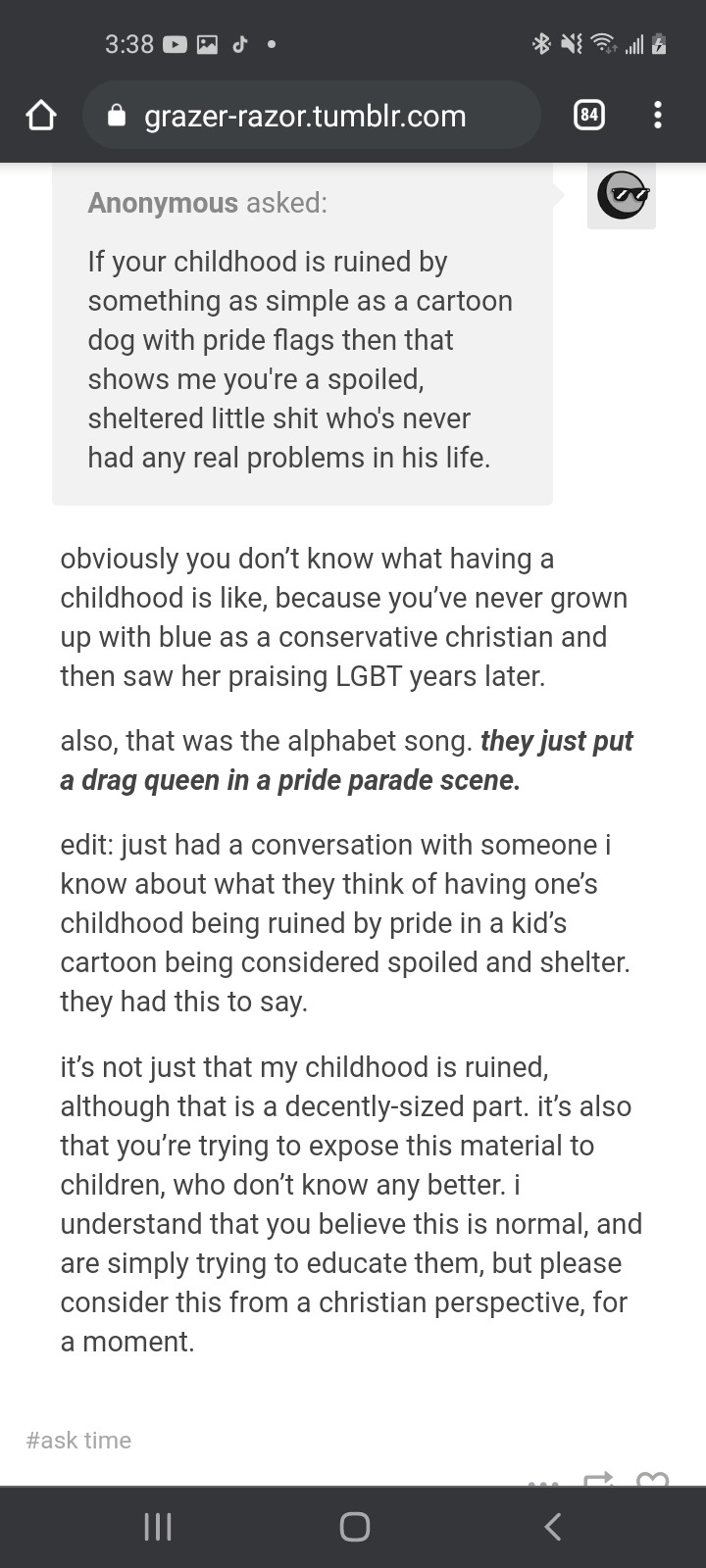
(Also, can we just talk about the absolute fucking cruelty in this answer? There are people out there that had their childhoods ruined by abuse, illness, losing loved ones, homelessness, poverty, bullying, near-death experiences, having their countries torn apart by war, a shitty foster care system, teen pregnancies, and so many other things that can absolutely destroy a life. Grazer's was ruined by… *checks notes* a cartoon character supporting gay rights and a drag queen singing a cutesy children's song. So yeah, if that's the worst part of his childhood he's pretty damn lucky, and the fact that he has the gall to still complain absolutely makes him selfish and ignorant. It's disrespectful, plain and simple, and if he were truly a good Christian he'd have some compassion.)
Okay, so Grazer has some weird "rules for me but not for thee" shit when it comes to religion. This isn't news. Where am I going with this?
Well, turns out he has this opinion about more than just religion. Know how I know this? His response to ESRB ratings and trigger warnings.
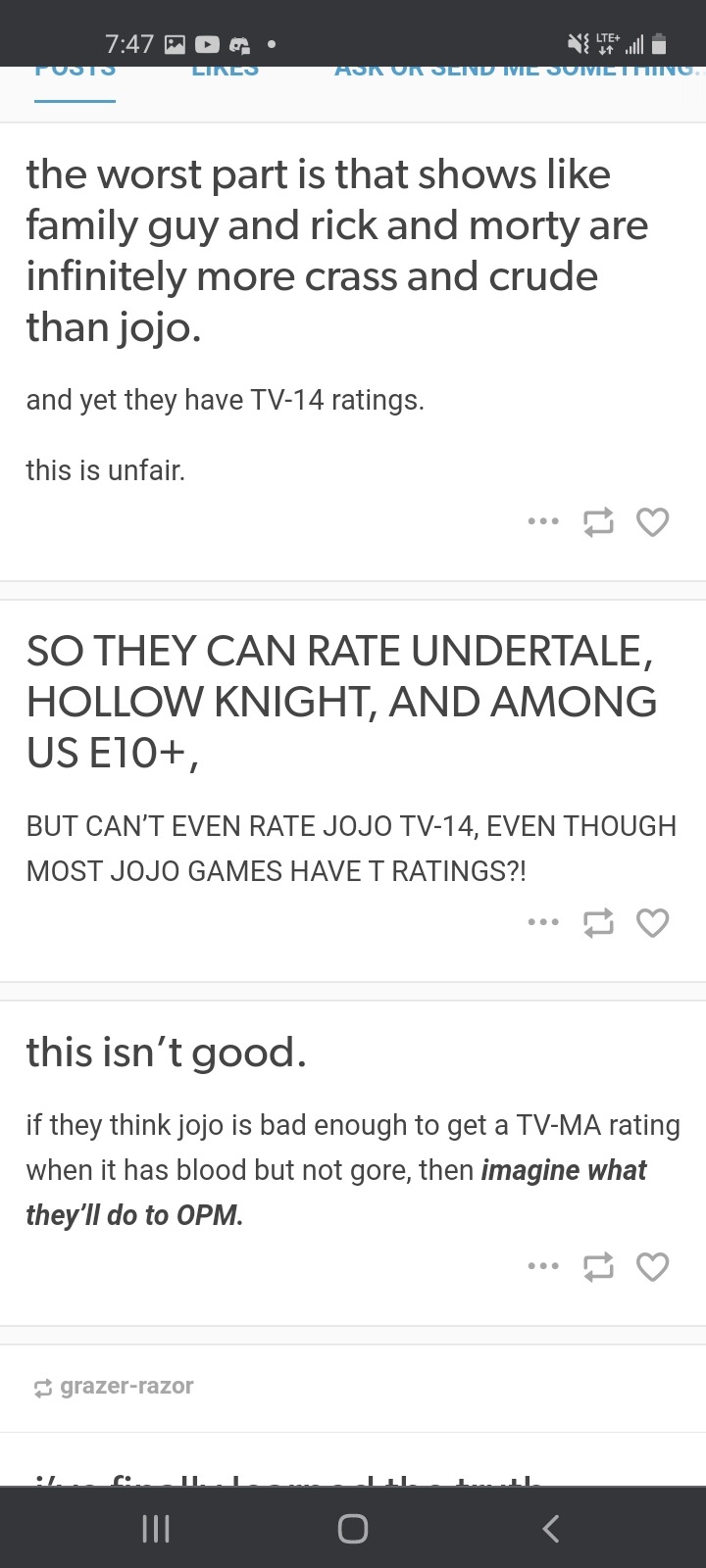
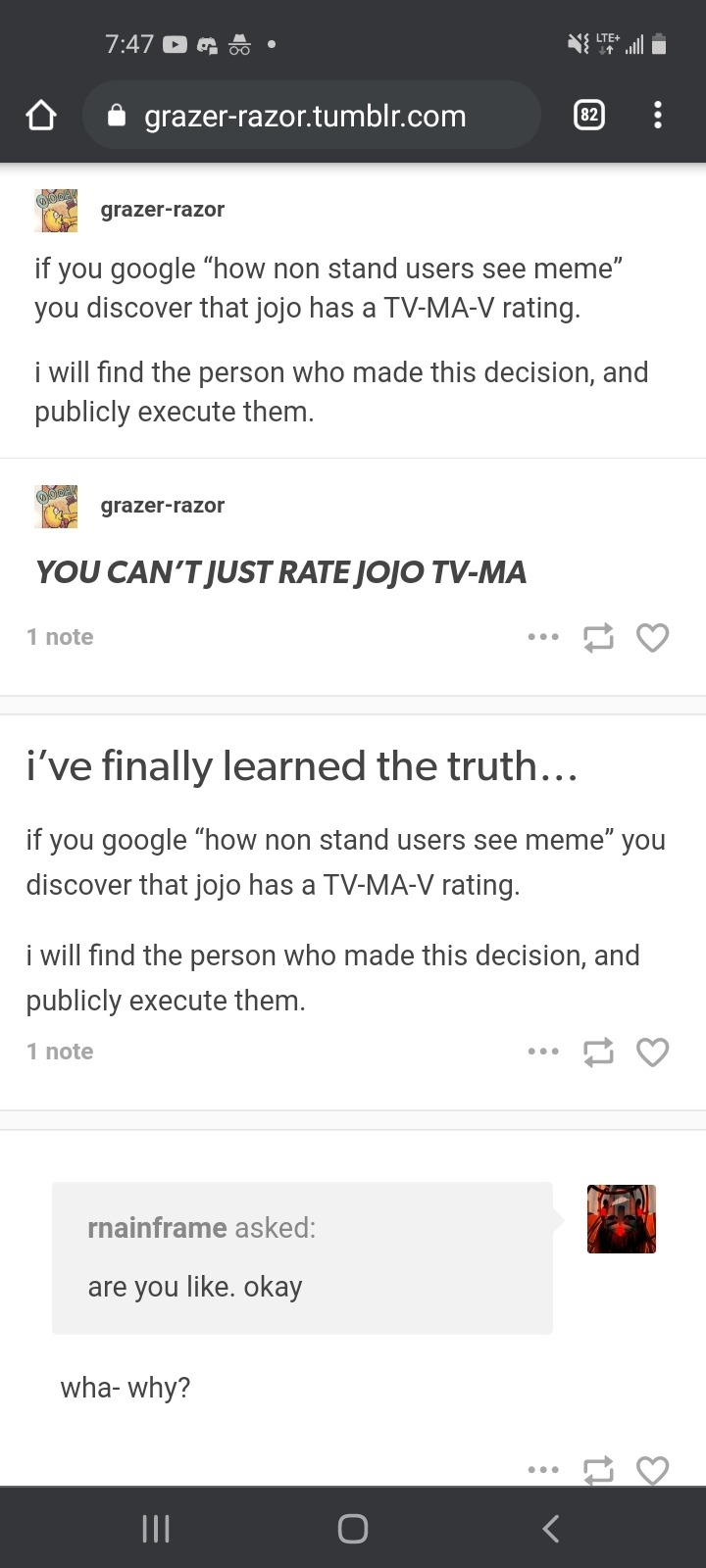


So it seems like Grazer sees the ESRB as some sort of moral compass, in a way. Something being rated E or E10 means it's pure and good and wholly unproblematic, while anything higher means it's evil and disgusting and he can't even look at it.
This is further confirmed by this post, where he flat-out states he sees the ESRB as deeming what things are and are not morally acceptable.
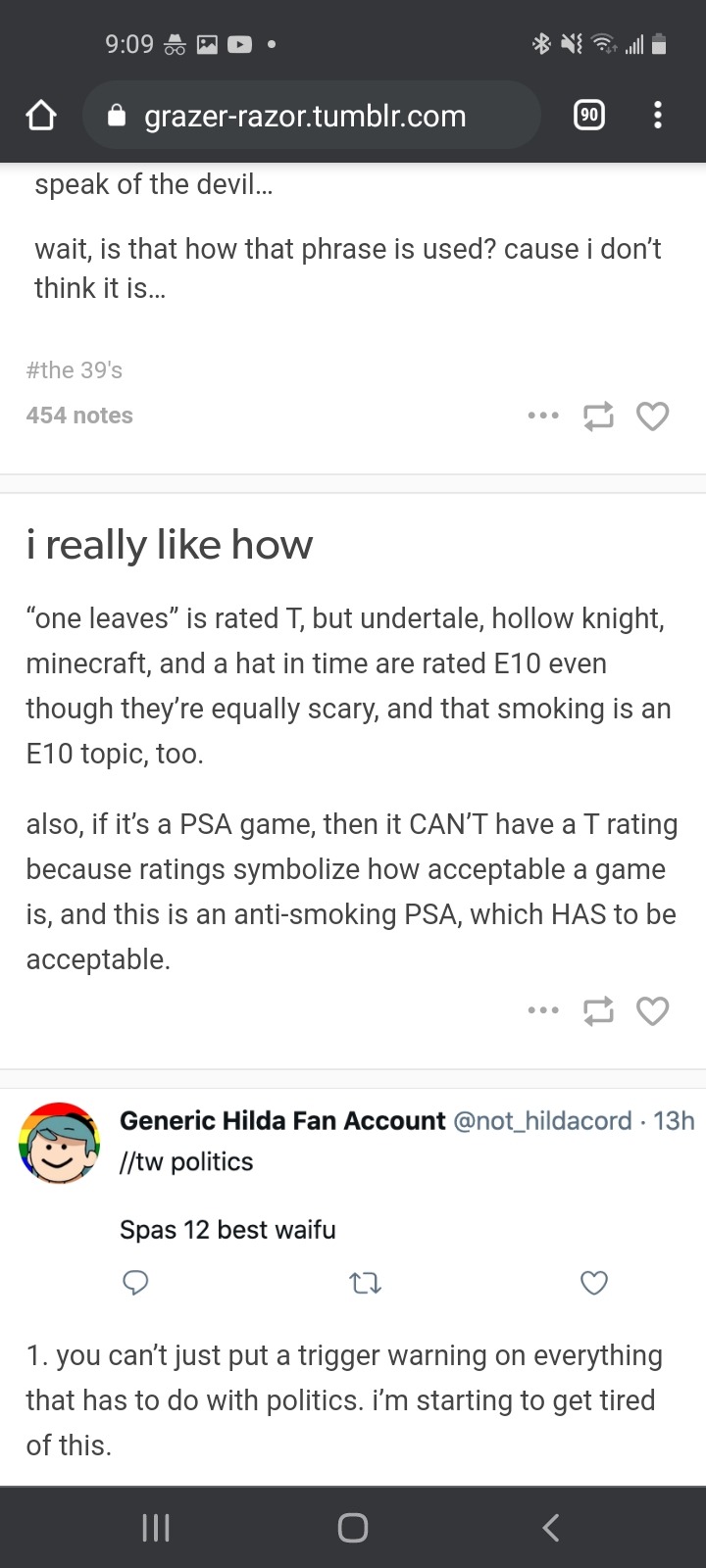
Now Grazer, I'm gonna explain this as best as I can, because it seems like you don't quite understand this. Read very carefully.
This is not the purpose of the ESRB rating system.
I repeat, this is NOT the purpose of the ESRB rating system.
The ESRB does not decide on what is and is not morally correct. It simply says "This game contains these topics, and as such is most suitable for people in this age group.". That's it. It's a guideline, not a rule.
Let's take cartoon violence, for instance. It's a very common warning the ESRB puts on games. Almost every game from Mario to Sonic to Crash Bandicoot and even Monster Tale has this warning. These games are all rated E for everyone. Does this mean those games are promoting violence to children, or claiming things like Bowser kidnapping Peach or Pinstripe trying to gun down Crash are perfectly okay and morally correct? Of course not. It's simply saying that these games contain mild, non-graphic violence, but most children should be able to handle seeing it.
On the other side of the coin, let's take a look at the warnings for nudity and sexual themes. Most games that contain these topics are rated T at the lowest and AO at the highest. This obviously isn't saying that nudity and sex are inherently bad or evil. All it's saying is that these topics are best handled by adults (And, regardless of morality, it is illegal to distribute sexual content to minors unless it's meant to be educational, like a health class textbook).
A few extra points:
. Games can be rated different things in different countries. Different countries have different regulations. Do you know why the blood in Danganronpa is pink? It's because in Japan, games with excessive amounts of blood and gore are given a Z rating (Japan's equivalent to an AO rating). They got around this by making the blood pink, securing the game its desired M rating. Meanwhile here in America, Mortal Kombat is allowed to show as many graphic, brutal deaths as it wants and still receive an M rating.
. ESRB ratings are not legally enforceable. I was so convinced as a 16 year old that the employees at gamestop would try to card me or something when I was picking up a copy of Bayonetta, and I was surprised when they simply rang me up in two seconds, no questions asked. It doesn't happen. For fuck's sake, one of the first games I ever played, at the tender age of four, was Soul Edge. A T rated game. The only instance ESRB ratings are legally enforced is in the case of AO ratings, as these games often contain incredibly graphic violenceor sexual content. If this outrage is coming from the idea that certain ratings will keep younger people from playing these games from a legal standpoint, don't worry. A nine year old is not gonna get arrested for playing Among Us. Just don't buy them GTA San Andreas or Leisure Suit Larry and everything will be fine.
. No two consumers are exactly alike. While one 13 year old may be perfectly fine with the jumpscares in Amnesia, another may be too scared to even go near the piano in Super Mario 64. That doesn't mean either of these games is rated incorrectly. The ESRB is there, once again, as a recommendation for the average consumer, and doesn't take individual experience into account. An individual experience is not their responsibility. It's also on parents (or you yourself!) To decide what the consumer can or can't handle.
"But Haley," I hear you say, "What if this piece of media DOES contain something morally bad?"
Well it's simple. You are allowed to like things AND still criticize the bad parts of it.
Hold on now, I'm not telling you that it's perfectly alright to enjoy things like Birth of a Nation or anything like that! Contrary to popular belief, there are some pieces of media that are truly too steeped in hatred and morally reprehensible things to be supported, even through a critical lense. The only merit things like that have is to serve as a warning: This is a terrible thing made for terrible reasons, and we should not allow it to happen again.
But outside of those rare circumstances, it's not so cut and dry.
Let's take a piece of media i actually enjoy, for instance, so you know I'm not a hypocrite: Persona 5.
Persona 5 is easily one of my favorite games in the Persona series. It does a lot of interesting stuff, the artstyle and soundtrack are (in my opinion) the best in the series, and overall it's very enjoyable for me.
But, like anything, it's not perfect. I'm incredibly uncomfortable with the hypocrisy the game has in regards to the sexualization of teenagers. While Kamoshida is rightfully condemned for his sexualization of teenage girls and Ann's persona awakening comes from rejecting this objectification, the game and story undermine it by not only putting Ann in a sexually revealing outfit, but also making light of Ryuji's sexual harassment by adult men (Allegedly Persona 5 Royal tries to fix this by making the men drag enthusiasts who think Ryuji would look good in drag and giving them more sympathetic personalities, but it's still really weird and hypocritical of the game to do this.). The teenage protagonist is also allowed the option to date adult women, including his teacher, and the game rarely if ever touches on the problems with this.
The game's homophobia also left a bad taste in my mouth. Aside from the aforementioned men who sexually harass Ryuji, the only other canon LGBT+ character is a bar owner who is either a drag queen or a trans woman (or both?). Sure, she's portrayed as being kind and protective of the protagonist, but there isn't much room to interact with her or learn more about her. On top of that, not only can the protagonist not romantically pursue his male friends (A feature that even the SECOND persona game had), he's not even allowed to give them gifts or platonically show affection towards them without the dialogue mocking him. The game that allows a teenage boy to date his teacher won't allow him to simply give his male friends a present.
And yet, despite those criticisms, I do still enjoy the game. I don't consider the game irredeemable garbage based on those poorly handled topics alone. And I also understand that for some people, those topics make them so uncomfortable that they don't want to play the game at all, and I completely respect that.
Criticizing the things you enjoy is not only normal, it's oftentimes healthy. Being able to step back and say "I like this thing, but I don't like the bad things it's done. This thing would be better if these issues were fixed." Sure, sometimes some people tend to complain a bit too much about the media they supposedly enjoy, but for the most part being able to acknowledge the bad with the good is a good skill to have.
Oh, wait, all of this means nothing because Grazer thinks that critically enjoying things is nothing more than an excuse to consume media he doesn't personally agree with. Okay then.
So if he can't even realize something as simple as "it's okay to criticize some parts of media that you otherwise enjoy", how can he be expected to look critically at a religion that he's been raised in and around all his life?
Soooo yeah, Grazer has some serious problems with black and white thinking that he refuses to acknowledge, further worsened by the fact that he's practically been brainwashed into believing that Christianity is the ultimate moral compass that everyone should follow. I understand that this tends to be an issue for neurodivergent people, but it's not an excuse for the actions he does that are related to these things (sending death threats to the ESRB, antagonizing others, etc.
2 notes
·
View notes
Text
Social Gaming: Playing the Crowd
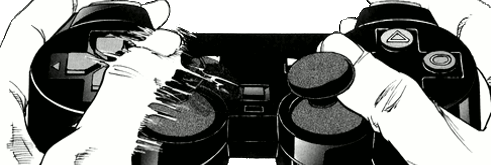
Games can be defined as ‘cultural artefacts, industries, social communities, material cultures and media practises’ (Hjorth 2011). The development of new technologies, gaming consoles and increase of graphics quality has created a shift in game development, focusing on researching and evolving online gaming communities. The convergence of media and gaming has created cross-platforms that focus on the collaboration with creative industries to target wider demographics (Jenkins 2006). Game users in contemporary society have evolved from players to new personalities or identities on gaming platforms, differing from original arcade and console games such as, Pacman, Pinball and Super Mario Bros; none of which were community centric (De Wart & Humphreys 2014).

Game developers are utilising social media platforms in order to advertise, publicise and communicate game content to audiences. Through platforms such as, Twitter, YouTube and Reddit developers are able to interact with users and audiences, facilitating two-way communication and allowing for feedback and game support. Consumers are able to use these platforms to prompt online discussions and create social communities of likeminded people with similar interests. The promotion and formation of these social groupings allows users a sense of escapism from their physical lives, granting users the freedom to pretend to be a completely different person (Huizinga 1938; Suzor & Woodford 2013, p.2).
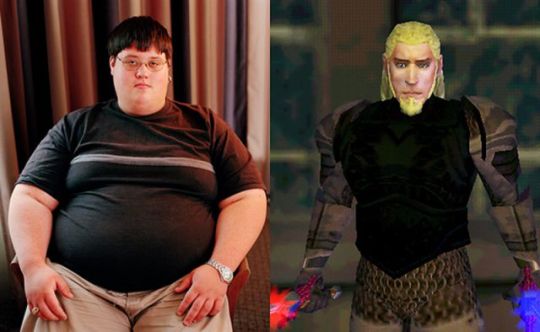
Historically, video game consumption meant giving full attention to screens and consoles, still allowing interaction and connection to the physical, real world. The nature of gaming and the surrounding community in contemporary society creates an entirely new social experience differing greatly from real life interactions. The concept of ‘play’ is considered an intrinsic part of human development, enhancing skills, respect for rules and regulations and allowing individuals to find a place within different communities (Farrell 2018). This idea should be acknowledged as a free activity, consciously outside ordinary or real life, that has the ability to absorb the participant “intensely and utterly” (Huizinga 1938). From this notion, the video game ‘player’ has evolved, learnings skills regarding regulation, respect and communication through the immersion of entertainment and gaming platforms.

Scholars have proposed theories classifying and compressing different modes of ‘play’, creating 4 dimensions: Agon, Alea, Mimicry and Ilinx (Caillois 1961). Mimicry, defined as “players’ escaping from themselves and becoming ‘illusory characters’” (Caillois 1961) can been identified as the most prevalent form in contemporary society as it concerns simulation, which is increasingly evident in game development. This dimension recognises the disassociation from reality and immersion of the virtual or ‘hyper-real’ created through games like Call of Duty and World of Warcraft (Baudrillard 1981). This classification of video gaming encourages the convergence of culture, technology and the economy through cross platforms and the assimilation of media forms such as: computer, mobile, online and alternative consoles (Cunningham & Turnbull 2014).

Through the creation and implementation of these virtual gaming worlds disputes are inevitable, creating conflict between contractual and innate rules of community or society and the informal social norms created in these dimensions for gamers (Suzor & Woodford 2013, p.3). Toxic or discriminatory gaming environments can therefore act as detrimental influences to involved individuals or online communities choosing or forced to conform to these mentalities (Suzor & Woodford 2013, p.3). These conflicts can be seen through the discrimination and objectification of women in video game storylines and content. The release of Grand Theft Auto V, received extensive online criticism and backlash through social media platforms upon its release. The game not only lacked the inclusion of female protagonists but portrayed the women in the game as subservient and facilitated “rampant misogyny and violence against women” (Martens 2013). The game does little to embolden women with most of the content portraying them as rape victims, strippers, prostitutes, victims or ‘crazy feminists’ (Petit 2013).

The demeaning portrayal of female characters along with other conflicts of real-life experiences and online games can be seen to have an immense impact on players invested in these virtual realities. Issues regarding violence, social interaction and self-image can be seen to influence real life interactions and behaviour of players (Devlin 2009). The encouragement and reward of macabre acts such as rape, violence, murder and theft in numerous games can been seen as a risk to players and society through the belief that the content will instil that these crimes are acceptable in real-life. Groups of society hold the belief that video games have enabled intolerance, harassment, violence and indecency, leading to crimes such as school shootings; evident through publication regarding the Columbine High School massacre and the Marjory Stoneman Douglas High School shooting (Scutti 2018, p.1; Seipel 2018).

Despite video game content attaining blame for a multitude of crimes, tragedies and effects on younger audiences the utilisation of these platforms and gaming content allows users a sense of escapism; breaking away from tedious activities and real- life communities they don’t feel they belong in. Online gaming allows users a new form of socialisation where players can relieve anger, stress, anxiety and depression through a virtual world preventing formal or detrimental actions that could be taken in real life. Users can create new identities and are allowed the autonomy to “negotiate rules of behaviour” within hyper-real and abnormal contexts (De Zwart & Humphreys 2014). Despite downfalls regarding content, online and social gaming produces positive user experiences. The convergence of social media and other information technologies with gaming has allowed a new vehicle to improve development, publicity, user interaction and feedback.
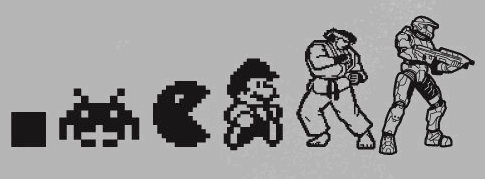
References
Baudrillard, J 1981, Simulacra and Simulation, The University of Michigan Press, USA.
Caillois, R 1961, Man, Play, and Games, New York, The Free Press of Glencoe Inc., USA.
Cunningham, S & Turnbull, S 2014, The Media & Communications in Australia, 4th edn., Allen & Unwin Academic.
De Zwart, M & Humphreys, S 2014, “The Lawless Frontier of Deep Space: Code as Law in EVE Online”, Cultural Studies Review, vol.20, no.1, [date accessed 20 May 2018].
Devlin, K 2009, ‘Computer game players 'more likely to drink, ignore family and have low self-esteem'’, The Telegraph, [date accessed 25 May 2018] <https://www.telegraph.co.uk/technology/news/4323067/Computer-game-players-more-likely-to-drink-ignore-family-and-have-low-self-esteem.html>
Farrell, C 2018, ‘Week 10 - Gaming Communities,’ MDA20009 Digital Communities, Learning materials on Blackboard, Swinburne University of Technology, [date accessed 11 May 2018
Hjorth, L 2011, Games and Gaming: An Introduction to New Media, Berg, Oxford, UK
Huizinga, J 1938, Homo Ludens: A Study of the Play-Element in Culture, The Beacon Press, Boston.
Jenkins, H, Clinton, K, Purushotma, R, Robison, A J & Weigel, M 2006, Confronting the Challenges of Participatory Culture: Media Education For the 21st Century, The MacArthur Foundation, Chicago.
Martens, T 2013, ‘‘Grand Theft Auto V’ review: Stubborn sexism, violence ruin game play’, Hero Complex: LA Times, [date accessed 24 May 2018] <http://herocomplex.latimes.com/games/theft-is-the-least-of-the-sins-of-grand-theft-auto-v/>
Petit, C 2013, ‘City of Angels and Demons’, Gamespot, [date accessed May 24 2018] <https://www.gamespot.com/reviews/grand-theft-auto-v-review/1900-6414475/> Scutti, S 2018, “Do video games lead to violence?”, CNN, viewed 16 May, 2018, <https://edition.cnn.com/2016/07/25/health/video-games-and-violence/index.html>.
Seipel, B 2018, ‘Companies face backlash for creating school shooting video game’, The Hill, [date accessed 25 May 2018] <http://thehill.com/homenews/media/389538-companies-under-fire-for-creating-school-shooting-video-game>
Suzor, N & Woodford, D 2013, ‘Evaluating Consent and Legitimacy amongst Shifting Community Norms: An EVE Online Case Study’, Journal of Virtual Worlds Research, vol.6, no.3, [date accessed 20 May 2018].
0 notes
Text
“It’s a Boy Girl Thing” Movie Analysis Part 2
Throughout the film, the problem of lack of racial representation is visible. There is only one main character of color and they are portrayed with a lot of stereotypes. This character is a jerk, uses people, and a player.
youtube
In the piece by Horton, Price, and Brown, it says “Stereotypes of blacks as lazy, stupid, foolish, cowardly, submissive, irresponsible, childish, violent, sub-human, and animal-like, are rampant in today's society.” Not only is the character portrayed by many of these features, but his nickname is also “Horse” emphasizing the “animal-like” stereotype. Horse uses females for his own sexual pleasure. While analyzing this film, I noticed that he admits having raped females. On their way to a party, the Horse says that he locks target on a girl that he is going to sleep with, and gives her a few drinks so her control will go “out the window”. All these portrayals further making the only person of color as the bad guy in the film.
The biased view of the women’s sexuality is easily viewed in this film. The concept that it is acceptable for men to be sexual while it is looked down upon in females is shown in the movie.

While it is obvious that the “popular girl” is sexually active and seems to be open and comfortable about it, she is called and referred to as a slut and a whore throughout the film. Coincidentally, she is one of the antagonists in the film. In the book review, Those Girls: Single Women in Sixties and Seventies Popular Culture, it is stated that “…women [had to] walk a fine line between being too sexually assertive (or not feminine enough), and too feminine (or not forceful enough)” (82), which is what happens in the film; the girls who are open about their sexuality like males usually are portrayed negatively.
youtube
When Nell comes to school dressed “provocatively” she is called a prostitute. As soon as certain events happen and people think she is not a virgin anymore she is immediately “slut shamed”. Nell starts hanging out with the school “bad boy” and starts engaging in sexual activity going along with the idea that “films…portrayed young single women by portraying sexualized females as self-destructive…” (42).
Overall, this film carries a genetic plot with many hidden biases and stereotypes. The film had many concepts of objectification and sexism in its plot. The characters were portrayed as either very feminine or very masculine. While the main character Nell seems to be the only person with real goals of an education and college she was oppressed and bullied because she did not fit the norm. Like many “chick flicks” this film looked down on women’s sexual desires and labeled the girls who displayed them as being the “sluts”. Ultimately, in the end, many aspects of this movie go against the feminist movement.
Works Cited
Ahmed, Sara. “Feminist Killjoys (And Other Willful Subjects).” Edited by Mandy Van Deven and Julie Kubala, S&F Online, Barnard Center for Research On Women, 2010, sfonline.barnard.edu/polyphonic/ahmed_01.htm.
Antone, Tiffany. “21 Female Stereotypes in Movies That We Are so Over: Over it.” SheKnows, 24 Mar. 2017, www.sheknows.com/entertainment/slideshow/810/21-female-stereotypes-in-film-that-make-us-yawn.
Pharr, Suzanne. “Common Elements of Oppression.” In Homophobia: A Weapon of Sexism. Chardon Press, Inverness, 1988, pp. 52-64.
Horton, Y., Price, R., & Brown, E. (1999, June 1). Portrayal of Minorities in the Film, Media and Entertainment Industries. Retrieved January 12, 2018, from https://web.stanford.edu/class/e297c/poverty_prejudice/mediarace/portrayal.htm.
Jhunjhunwala, Udita . “Bending The Gender: The Portrayal Of Women In Films.” Verve Magazine, 25 Dec. 2017, www.vervemagazine.in/arts-and-culture/bending-the-gender-the-portrayal-of-women-in-films.
Kimmel, Michael S. Masculinity as homophobia: fear, shame and silence in the construction of gender identity, Centre for Gender & Development Studies, University of the West Indies, 1996.
Morgan, Kathryn Pauly. “Women and the Knife: Cosmetic Surgery and the Colonization of Women's Bodies.” Hypatia, vol. 6, no. 3, 1991, pp. 25–53. JSTOR, JSTOR, www.jstor.org/stable/3809838.
Olson, C. C. "Those Girls: Single Women in Sixties and Seventies Popular Culture by Katherine J. Lehman (review)." Film & History: An Interdisciplinary Journal, vol. 43 no. 1, 2013, pp. 41-42. Project MUSE.
Omosupe, Ekua. "In Magazines (I Found Specimens of the Beautiful)." Making Face Making Soul. Ed. Gloria Anzaldua. San Francisco. Aunt Lute Books, 1990. 169.
0 notes
Photo

Facebook is a 500 billion dollar company. Facebook’s co-founder, chairman and CEO, Mark Zuckerberg is worth 72 billion dollars; seventy-two billion dollars for a stolen idea, selling absolutely nothing manufactured or tangible. Seventy-two billion dollars for selling people as the product. Us. Our friendships, our families; our relationships, our likes and dislikes, our commentary, our mental health and emotional states, our political leanings, our religion, our spirituality, our purchase history, our passions, our privacy, our agency. Our humanity. This scumbag is a billionaire because he’s somehow managed to dupe us into believing we need Facebook as a middle-man for our very own human relationships; human relationships that have thrived without such destructive, lucrative intervention for thousands of years.
Duped right into mass addiction. Zuckerberg has found capitalistic value in the most essential aspect of being human: our relationships.
And what have we as a society received in return?
(Oftentimes irreparably) fractured or broken friendships and relationships.
Connections that persist with those who should have been relegated to our past, ensuring quantity continuously prevails over quality.
An exponentially growing intolerance for ideas, viewpoints, and perspectives that differ from our own brought forth by echo chambers born of computer-generated algorithms.
And thus, a dark, broken and divided country.
Rampant and arbitrary censorship (as well as suppression of free speech) at the whim of the corporation.
Deplorable (and live!) violence.
A for-profit corporation working in tandem with governments to collect data on its own citizens against the will of the citizens; a total and absolute sacrifice of the people’s privacy, now owned by Facebook, Inc. and would-be and current oppressive regimes and governments worldwide.
Misogyny, sexism/gender inequality, and unchecked violence toward women, while diligently censoring “offensive” content created by women (such as breastfeeding and menstruation centered topics) ensuring the objectification of females while suppressing all agency.
Blatant and unapologetic racism, and the supression of civil rights campaigns that don’t seek to benefit the prevailing class.
Reprehensible psychological experiments in which the unknowing and thus non-consenting people are the guinea pigs.
Depression, jealousy, anger, envy, “FOMO,” and a general collective sinking of our happiness and stability as a species.
A threatened democracy already on the brink of being swallowed whole by a corporate capitalistic oligarchy (if it hasn’t been already).
A total lack of options or choices in the social media realm as Facebook consistently purchases competitors (or steals the ideas of those who have rebuffed their offer—read: Snapchat) consistently leaving us with one social media overlord we must obey if we want to participate at all in the social media sphere. Facebook now owns 4 of the top 5 downloaded social media apps (Facebook, WhatsApp, Instagram, and TBH) in app stores.
And most importantly, an irrefutable and utter addiction to this destructive hub we can’t seem to shake because every new modification to the platform is purposefully designed to keep us there, for as long as possible. And we keep takin’ the bait.
Meanwhile, Zuckerberg’s bank accounts are getting fatter and fatter with no end in sight. Don’t be a suckerberg. Forsake the book.
#facebook#social media#social networking#big tech#mark zuckerberg#heartless billionaire#wage stagnation#income inequality#us income inequality#forsakebook#suckerberg#facebook is awful#the new robber barons#silicon valley#science and technology#business#us politics#social media addiction#facebook scandals
0 notes
Text
Distract and Subvert
With the advent of Zoe Quinn releasing a book on her experience with GamerGate, and I can’t stress the “Her experience” part, I wanted to weigh in on the situation. To be honest, I was ignorant of Quinn outside of her role in exposing the way gaming media conducts its sordid business. I legitimately knew nothing about the harassment or whatever she had received, just that she was a sh*tty girlfriend that slept around on her dude, for nothing more than high marks of her sh*tty games. Anita Sarkesian is in there somewhere but I don’t know how. The gist of what I took away from my initial foray into GG was that there was wild corruption and conflict of interests within the gaming journalist communities. I’ve seen several videos about this and read even more article. As a gamer of some 30 years (I am old as f*ck), I knew that the industry was a little bit of a boys club in the regard. It made sense that gaming companies would placate reviewers with this and that. If you’ve ever worked at a GameStop, you saw this firsthand. I did. Swag days were the best! So Imagine my surprise when, as I dug further into this story, it morphed from the very real issue of ethics in gaming, to some wild ass third-wave feminist, quagmire.
Now, before the pitchforks come out, i want to say, I am, unequivocally, feminist. Just not this sad internet feminism that has saturated everyday media. My ideals stem from the fact I was raised by a bra burning hippie turned overworked mother. I watched her toil in her profession while people with much less experience, male and female, were promoted over her because of connections, looks, or penises. I spent ample time with my grandmother in her mountain residence, a place I considered a refuge from my abusive ass home, where I learned culture, commerce, and free thinking. Admittedly, my grandma was probably a witch but that aspect of who she was just made her all the more well-rounded I think. These women shaped my perception of what it meant to be a woman in America. What it meant to have to exist in a male dominated world. And it was sh*t. I knew that at 5 years old. I wanted more for my mother. I wanted more for my grandmother. I wanted more for all women in the world. I am a card carrying feminist raised by strong black, feminists. I legitimately don’t understand how women are treated so poorly. How can we belittle the women in our lives so aggressively? They’re our mothers, sisters, cousins, wives, and more. They’re partners in this thing we call life. Why are we treating them so differently? Why are we treating them as commodities instead of the vibrant creatures they truly are?
I would just like to reiterate, however, I find third-wave feminism to be ridiculous and often far more problematic than helpful but that’s a discussion for another day I think.
As I did my research and learned more about what GamerGate became, as opposed to what it started out as and should have actually been about, I found myself disgusted. Not with the perceived chauvinism or attacks against Quinn, but with the way the media so transparently tried to shift focus. Within a week, the issues brought up about the ethics in gaming journalism were lambasted into some big ass patriarchal conspiracy. And instead of reporting on the facts that certain individuals n the journalist community exchanged sexual favors or monetary bribes for advantageous reviews and articles, we get “no more ghurls in m’ games”! The speed of acceptance by the media spin was insane. Actual publications like the New York Times, not just IGN or Otaku, were publishing articles about the toxic nature of the gaming community towards women. The vast majority of these articles were written by the very same people the initial inquiries of GamerGate were trying to expose! Almost everyone missed that through and, instead of taking a good hard look at what it mean to be a journalism not just in gaming but in general, we get the villainizing of the male gamer, BY GAMING JOURNALISTS!! Literally, gamers call bullsh*t on your bullsh*t tactics, and in response, you use those same bullsh*t tactics to essentially divert attention from the fact they called you out on your bullsh*t to begin with!
I do believe there is a problem with the gaming community but that needs to be taken with a grain of salt. A lot of these aggressive assholes online are in the minority, they just have the loudest voice. The same could be said about and visible “movement”. No one wants to report on the intelligent debate because that’s not sensational enough. No one wants to talk about how things are actually improving in the gaming space or how we as a demographic are exceptionally welcoming as opposed to something like music or Hollywood. Yes, there is a very loud, very vocal minority that most people outside of the gamin culture take to heart. That gatorade douchebag playing COD that bashes women and teabags his opponents constantly or that fat, zitty, neckbear who’s playing some random RPG in the cold recesses of his mother’s basement. Those people exist, sure, but they’re not all of us. They are the problem though. It’s these type of people that the mainstream media focus on. It’s these characters that end up labeling and perpetuating suck ire from everyone in society who doesn’t game. It’s these characters that people like to focus on to villainize an entire culture. It’s the equivalent to saying all Muslims are terrorist even though the vast majority are not. Or that all cops are bad even though the vast majority are not. And while that demographic of gamer is very loud, there are those of us decrying, just as loud, their actions but no one reports on that. The mainstream media pretends that the counter-voice is a hushed whisper because everyone wants to watch a crazy person be crazy. It’s that “he is NOT the father” mentality that permeates out society and it’s bullsh*t.
In my experience, the gaming community is very inclusive; very welcoming, even if your point of view runs contradictory to the overall consensus. Where else can someone like a Zoe Quinn or an Anita Sarkesian even find an outlet for their preferred voice, as problematic or volatile as they can be. Let them try that sh*t in the Hollywood arena. They’d be mercilessly drowned out in second. But, within the gaming community, they’re allowed their voice and perspective. And admittedly, some of their arguments are legitimate, albeit embellished. For every cheesecake representation of the female form, there is one that is equally strong and compelling. For every Princess Peach, you have a Samus Aran. For every oversexualized Tifa Lockhart (a personal favorite of mine, by the way) you have an equally compelling Aloy (Another favorite of mine). I don’t think it’s a huge issue that DOA: Beach Volleyball is a thing. I do believe, however, we need more games like Horizon that showcases the strength and willpower of a strong female character where the polygon count in her bust isn’t even an issue to begin with. Women protagonists don’t always need to be sexy spies, or sexy ninjas, or sexy anything. We need to better represent a realistic female voice in our games. That doesn’t mean you have to adjust the polygons to look like Lena Dunham instead of Scarlett Johansson. Female characters can be every bit the badasses the male ones are, and still be considered classically or ideally attractive. And if you don’t believe so, go make a f*cking game reflecting that. That is the beauty of the gaming industry; Anyone can create whatever they want as long as they have the tools to do so. So stop complaining and point fingers. Get out there and create the change you want.
I got a little sidetracked from my initial point but I felt elaborating on those two points, the toxicity of the online gaming community and perceived sexism and objectification of women in gaming, were necessary to clarify my position on the overall Gamergate fiasco. I’ll probably write at length about their issues at another time but my point in all of this is, look what just happened. I wrote about two polarizing topics within the community right now and you’re feeling some kind of way, most likely. That’s exactly what happened with Gamergate. That’s exactly what these “Journalists” did. By deflecting their responsibility for their sh*tty actions, they created and entirely different beast. A rampant monstrosity that is poising the culture as a whole. Instead of taking the call to heart, these assholes desired to attack, and we’ve been wounded ever since. Should those discussions about sexism and abuse have happened? Absolutely. But definitely not in the toxic, antagonistic nature that they are being shouted about now. What started out as a call for accountability from the gaming community toward the gaming journalists, turned into a crusade against women by those destructive stereotypes of gamers, designed by gaming journalists to deflect the initial call for responsibility and reform. Now Zoe Quinn is releasing a book, in partnership with Anita Sarkesian (you had to know they would find themselves into this situation even more so than they already are) that will probably change the narrative further, shifting focus even more from the core issues we all wanted to showcase.
Let me be clear:
What happened to Zoe Quinn was sh*tty and no one should have to deal with that, period. Regardless of how you feel about what she did beforehand, how she went about promoting her game, or who she did or didn’t sleep with, Zoe Quinn did not deserve the vile treatment she received.
While believe Anita Sarkesian is a detriment to both feminism and gaming over all, I understand and accept the fact that the conversation she started needs to be had. Even if Sarkesian’s way of talking about it might turn off a lot of people, myself included.
We as a community need to be better at calling out the bullsh*t we see be it hypocrisy, abuse, harassment, or the like. It’s not a boys club anymore. It’s an entire living culture that has ebbs and flows. We need to accept hat and open ourselves up to growth. The old ways should be left in the past and newer, better ones created was we move forward, together. Vagina and penises, alike. Or, you know, whatever you identify with.
Gamergate was never a “it’s me or them” situation that i turned out to be. It was a legitimate movement to change something that had been crippling the growth of our community for years. What it turned into was something even worse at the hands of the people who we wanted to change by shining a light on there shortcomings. Instead of accepting that criticism and look inward as a means of self evaluation, they lashed out at the very people who support them. Distract and subvert; a model on destabilizing whole countries that is actively working in America as we speak. The insidiousness of this shift in message perpetrated by those already branded guilty was incredible to see. These people would do anything to preserve that status quo. The episodic nature and ultimate dismissal of the core issues within Gamergate are, in themselves, the problems that gave rise Gamergate in the first place. The fact that no one seems to want to acknowledge any of this is completely wild to me and indicative of symptoms proving that the problems will continue. As long as we in the community continue to fight about polygon tits and 12 year old assholes, the real issues will ever find resolution.
0 notes